#and i always have a short story anthology going to read a couple between novels
Explore tagged Tumblr posts
Text
Me: ugh, I'm reading so many books simultaneously, I need to finish some so I feel less overwhelmed
Also me: let's start reading this poetry collection 😃
🤦♀️
#my actual life#tbf most of these books are read in different situations e.g. one is only on my phone when I'm not at home#one is only in the bathroom#two i read at specific times/dates#and i always have a short story anthology going to read a couple between novels#but still#so many on the go and so many still tbr#I don't know how people with massive tbr piles do it I'm stressed by the 18 books still on there
3 notes
·
View notes
Note
many congratulations on completing nie wirst du!!! what a ride 🎉🎉
for writer's ask -
🕶️ - what helps you concentrate when you write?
📗 - do you want to write something outside of fanfiction? if so, what about?
🐇 - do you write for yourself, for others, or both?
🥳 - why did you start writing fanfic?
Thank you!! And thank you for the questions :)
What helps you concentrate when you write? A couple of things! I can do a drabble in between other things or even sneakily write one at work, but for longer prose or poetry what helps most is knowing I have a sufficient amount of time set aside for writing. I also write best in liminal spaces, especially trains. Airplanes are okay too because I don’t like flying and writing is a great distraction. Other things that help in no particular order: sufficient food and hydration, white noise (my current favourite is ocean waves), having done some stretches because I always have back pain, my adhd meds, and knowing I don’t have anything urgent I need to be doing instead.
Do you want to write something outside of fanfiction? If so, what about? I am a writer irl though I don’t give many details on here. I’ve mainly been writing poetry for the last couple of years, but fic has actually given me an entry point back into prose. As a rule, I love writing about the different ways humans connect with each other (or don’t) and the way our bodies move in relation to each other. I also enjoy delving into complicated relationships.
For you write for yourself, others, or both? Both! I write for myself in that I’ve always had a need to write. It helps me be a person in the world to have that creative output and play around with words in a way I wouldn’t get to do otherwise. Fic’s been playing a large role in helping me adjust to a full-time job and still feel vaguely fulfilled in life. Poetry has been very cathartic in the past and has now become a way for me to delve deep into that fun experimentation with words and the way they appear on the page. But I’ve also always known that I want my writing to be read. Whether it’s here on tumblr, over on Ao3, in literary journals and anthologies or, one day, in a full book of my own, I like putting my writing out in the world and having people read it. What I like even more is when people actually want to talk to me about it or when I find friends through reading each other’s work. So yes to all three. I write to feel fulfilled, I write to bring others writing they might like to read, and I write to have some of that feedback come back to me.
Why did you start writing fanfic? There are two answers to this. When I was about twelve, I wanted to write but didn’t really have a concept of what made original work original work. I started a few fics for different fandoms and finished none of them. I also started a short story around that time that ended up turning into a novel I worked on for over four years. Looking back it is of course slightly embarrassing to read my writing from back then, but at the same time, I’m still so proud that young me persevered over so many years and finished a whole book. And I’m glad knowing younger me always had a place to go to in their head if life was a lot. As for Rebecca fic — I saw the musical in Vienna and it changed me. I didn’t expect it to, I didn’t even realise it had done so after I left the theatre, but when I woke up the next day something “had changed within me” (ha!). I spent my seven-hour train journey back home listening to the Stuttgart cast recording, devoured the book, read most Rebecca fics on Ao3 and was appalled to find that there were very few finished fics that gave either the narrator or Danny a happy ending. I was also in that strange liminal place between finishing university and getting a job, so I had a lot of free time and a lot of creative energy waiting to be tapped. Then I started writing Was Wird Aus Uns and was met with so much excitement, enthusiasm and kindness that the rest is history. Now it’s just become a beloved part of how I spend my free time.
3 notes
·
View notes
Text
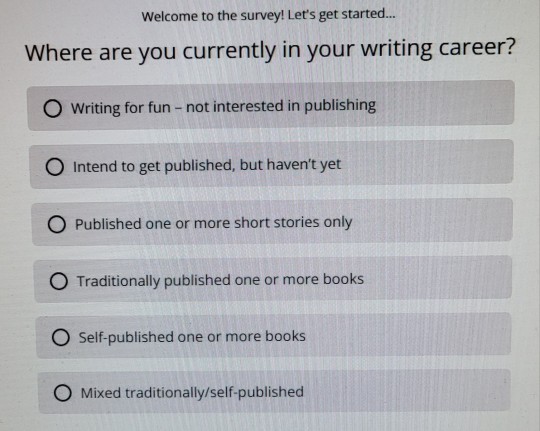
There's something I don't like about this survey question, and I've finally figured out what it is.
The question says:
"Where are you currently in your writing career?"
With the following answers, of which you can only choose one:
Writing for fun—not interested in publishing
Intend to get published, but haven't yet
Published one or more short stories only
Traditionally published one or more books
Self-published one or more books
Mixed traditionally/self-published
All of these are perfectly valid areas to be at. That's not the problem.
I dislike how these options are being framed as part of a single "career path" that moves in only one direction: the ultimate goal being traditionally published books.
Easily, you could argue this is the most well-known path of a "writing career" (very old-school, "write every day" type mentality path). But it's not the only one.
Just to use myself as a personal example, I don't know how to accurately answer this question.
My facts:
I have not been published by a big press
I self-publish my own fanfic and original fic
I have had a story published in a kickstarted anthology press which created hard copies of the anthology
I have never completed a novel or novella
I have wanted in the past to have a traditional publishing path
I have written commissions for actual monies
I am currently writing for fun with no desire to traditionally publish at this time, even though this may change at some future point
The most accurate as in "up to the minute" answer is the first, that I am writing for fun.
But the way this question is worded suggests that I'm "just starting out". That I'm "new" to writing. I can almost guarantee the next suggested solutions will be "Writing 101" type lessons.
I also take offense at this answer option, "Published one or more short stories only", specifically because of their use of "only".
I see this a lot in writing spaces (the strongest of which is/was NaNo spaces).
The implication of the "only" is that short stories are not "real" stories. They're seen as "practice" for the "real" work of writing novels. They're seen as stepping stones on the path to becoming a Real Writer who writes Novels
Sure, you can dabble in short stories, as a treat. Maybe you can even create a collection of them once you're established. But when's your novel coming out? You know, when's your real writing coming out?
It's obviously not like there isn't a lot of crossover between short story writers and novelists. Most writers do both at times, to varying degrees.
But they're not the same thing.
Short stories aren't "novel practice" pieces. Writing a short story is a skill on its own, just like writing a novel is its own skill.
Personal example again:
When I was in high school, I wanted to write novels. I had a couple going at a time, including a large high fantasy epic. It seemed very easy, then. I almost exclusively read novels. I had a very rigid daily routine via school. I had much fewer external stresses in my life at the time.
By the end of college, my brain didn't work like a novel anymore.
During and immediately after college, however, I came to fanfic. I found the StoryADay writing community. I discovered flash fiction and micro fiction.
One of my biggest struggles in school was the mandatory 5 page essay. I could always make my point in about 2. But now... You're telling me people can tell entire stories in 100 words or less??? Sign me up!
I've never written anything novel-length since. Even the longest fanfic I've ever posted is only a little over 23,000 words, and that took me ages to put together. (For the record, it's also more like a flash novel or a series of vignettes, in that very few chapters continue the same inner story.)
So, for all that, where does that leave me on the survey?
I will, for the sake of argument, discount my AO3 works from counting as "self-published". That still leaves me having "published a short story" in someone else's book AND "writing for fun" with no intent on... I guess monetary? publishing.
Which, really, tells them nothing about my "writing career".
#fleet rambles#writing#it really isn't the Stephen King type linear progression#write for fun to short story to published novel#that's also a very capitalistic mindset of why people write#it's fine if that's how you want to do it#but please don't assume that's the only available option#fleet gets personal
0 notes
Text
hey new followers
i think you guys are here bc of the Ousmane Sembene post? which is neat bc i’m always happy to talk about him! but yeah, if anyone is interested, I’m down to talk more about my favorite African writers or how I find/research african literature as a (white and monolingual) American.
Growing up in the US we’re really really discouraged from pursuing or enjoying literary traditions or even films outside the western canon, and it’s definitely a learning and unlearning process to break through white-normative Anglophone literary rules and actually learn how to appreciate art from other literary traditions. Even the novels from international writers sold in my town are...filtered to only include US sympathetic books and books originally written in english. So a lot of the books I recommend I’ve had to find online, borrow from friends, or hunt down second-hand. I’m definitely still in the beginning stages of working through the propaganda i grew up on so i really appreciate any corrections/advice that folks have, especially if i misrepresent or misinterpret one of your favorite books.
that all being said, here’s a couple more african writers whose works i’ve read this month that I recommend: (my keyboard doesn’t let me type accent marks so I have to use the Anglicized versions of several of their names)
-Yvonne Adiambo Owuor: She’s a late 20th century/contemporary writer who’s written a bunch of short stories, plays, novels, and linguistic essays. That being said, tracking her work down in English is a pain in the ass, and the English short stories that are out there have an annoying tendency to only be published in anthologies that can be hard to hunt down. That being said, I definitely think that finding her writing is worth the effort-she has one of my favorite writing styles I’ve come across, it’s really dense and descriptive but also very very visceral when she wants it to be? Expect to have a dictionary or google on hand going in-I found the reading to be a really slow but rewarding process. The two works I’ve been able to read by her are the Weight of Whispers (a “short” story) and Dust (a full length novel). Owuor writes a lot about the tensions between Kenyan, Rwandan, and Ethiopian people caused by migration and the political strife and genocides of the 1990s. Weight of Whispers is a really hard, really heartbreaking story about one wealthy Rwandan family’s struggles in the aftermath of fleeing the genocide, and the way in which their marginalization as refugees slowly robs them of sympathy from their friends and neighbors, and the way that otherwise wealthy and intelligent Africans were forced to debase themselves and conform to european colonizer’s expectations in order to survive. Dust is technically a story of one family’s grieving process after they find the body of their son, who was killed by police in the streets, but it’s also a novel about borders, colonization, the uneven construction and censorship of historical narratives, forgiveness of historical wrongs, and also grief. It’s really really good
-Binyavanga Wainaina: another Kenyan author, if you’re familiar with this guy from his satirical How to write about Africa essay, then you know that he’s fucking funny. A lot of his work is mostly short stories, semi-autobiographical writing and political essays written to his fellow Kenyans. I’m gonna be honest: I don’t understand Gikuyu politics enough to appreciate his political essays (I think the closest english term I have to describe the issues he writes about is “tribalism” but that’s not quite right) but I did like his short story An Affair to Dismember, which I found for free here
-Sony Lab’ou Tansi: This guy is one of the GREATS of 20th century African writing, but since he was Congolese (he lived in both Kinshasa and Brazzaville) most of his writing is only available in French, and English translations can be really hard to come by. I’ve been able to find a couple of his books translated, but I heavily suspect the translations themselves aren’t great: there’s a real difference in quality between the structure of the plot/the pacing of certain scenes (a lot of foreshadowing, dramatic irony, and repetitions on a theme), and the actual sentence-to-sentence writing style, which I found hard to stay engaged with. Like a lot of African writing, I’ve found that Tansi has a tendency to introduce a lot of plot points, minor characters, and political analogies, but he doesn’t hold the readers hand or focus on any one thing in particular, so you have to either take notes or be okay with not really “getting” everything he has to say. I just finished the Antipeople, and I don’t want to give away the plot but just know going in to expect a lot of violence, impossible choices, deceit, and upheaval.
-Honorary mention: Jose Eduardo Agualusa is an Angolan writer of Portugeuse/Brazilian descent, so he doesn’t really draw from any inherently Angolan storytelling devices or art movements, but I thought his novel A general theory of oblivian was so so good that it had to be included. At face value, it’s about a old Portuguese settler colonialist living in Luanda who quite literally walls herself into her apartment for three decades to avoid dealing with the Angolan war. This novel is translated into English and is pretty easy to find, and the translation is exceptionally done-it is a very short book and not a word is wasted. Expect some fun experiments with a mixed epistolary and prose format, some very honest descriptions of European bigotry/white supremacy, and a lot of very real, very human side characters.
that’s all for now, let me know if you have any recommendations?
0 notes
Text

I read The James Joyce Reader a couple of years ago for a book club I was reading. (It was in my hometown public library)
The copy I read from had the title page in the wrong order (so that The James Joyce Reader came before The Dubliners) but fortunately it was in the order that I'd requested (i.e. Dubliners before The James Joyce Reader). This would have been very frustrating, because having read the actual first book in the reader I was then really curious about whether I would be as good a Joyce reader in general as all these professors I was reading were -- e.g. I've always heard Joyce described as a "master of the short story," but the first part of The James Joyce Reader really isn't much like short stories at all, so my expectations were kind of let down by what I actually read.
The book, though? It was really good. It was not only really well-edited but seemed to want to make a lot of these Joyce texts, which had been around for over 50 years, as accessible as possible. It helped that the first part was basically just a table of contents for Dubliners so that I knew what was coming, but it still was very nice and refreshing.
It wasn't exactly exciting reading, for example, but the Dubliners table of contents included a whole lot of fun facts, like this:

Or this:

(In particular, it must have been quite a shock to Joyce and his parents that The New York Times called his novel "a story of the slums.") I was so excited about all these little anecdotes I was getting, and so relieved when I was done reading it. (I'm so glad The Odyssey is a poem and not a book. You can get a similar sense of relief in reading it, at least as much as you would if you saw a poem about Troy written on a tombstone with "he died young" engraved underneath.)
On the other hand, reading that table of contents reminded me that there's a lot I don't know about the Joyce canon and I have to work on that. If I'm ever going to get all the stuff I want from The James Joyce Reader, I'll need to get in and read its companion book, too (I think that's called The Joyce Anthology, but it might not be). And, in addition to all the fun facts about the books themselves, there was a whole other section in the Dubliners table of contents about what the Joyce canon is. (Like a lot of Joyce anthologies, they start out with a section called "A Few Words About the Book")
I don't know what all there is to know about the "Joyce canon." I just know I have my own mental catalogue of what I've read by Joyce, and while I know it's not even all of what he wrote, it's at least a good start. I was kind of curious about what the rest of the "Joyce canon" was, and whether there was any overlap between "Joyce" and "Joyce" outside of that catalogue -- and as it turns out, there are definitely some people who consider the "Joyce canon" to include James Joyce. I once heard a lecture that mentioned "Joyce," but only by saying he "wasn't the sort of guy who would like to be called James Joyce -- he preferred Joyce." There's nothing in the table of contents that seemed to say that the anthologies included "Joyce" specifically (although they did say they included "Joyce and his contemporaries," which is probably the same thing) -- so either he was so influential as to have been included in all of these, or they all agreed to include all the stuff he wrote and just used different names for all of it? Either way, I would want to know.
3 notes
·
View notes
Text
The Best Yuri of 2019

2019 was a challenging year for many, in and out of the anime community, which is still reeling from the horrific attack at Kyoto Animation’s first studio in July that killed 36 people. However, I want to take this moment, as we start a new decade, to reflect on some of the greatest achievements in Yuri.
2019 marked the genre’s 100th anniversary, 100 years since Nobuko Yoshiya released her landmark lesbian novel Yaneura no Nishojo that shaped and created Yuri as we know it. It was possible Yuri’s best years ever, as more incredible titles were released and localized, we experienced fantastic events and moments, and more. This article is part of my continuing celebration of all things Yuri!
Note that many of the works mentioned came out before 2019, but they either were first released in English during 2019 or hit particular high points during this year. Now then, here is the best of Yuri in 2019!
15: SukeraSparo
This Japanese Yuri visual novel developer is starting to reach new heights as they set their sights on releasing new and innovate Yuri titles. The English release of The Expression Amrilato, an educational Yuri visual novel that teaches the player Esperanto, was one of the most unique and creative works I have the pleasure of playing this year. But, they outdid themselves this year, releasing a sequel, Itsuka no Memorajxo, creating one of the most beautiful Yuri games in Folklore of Kudan, and founding a sister brand, SukeraSomero, “to fill the world with YURI!”

The Expression Amrilato is available in English for PC on Steam and Mangagamer
14: Mage & Demon Queen
This outrageous and vivacious webcomic hits its stride in Season 2. After setting a solid foundation, this masterpiece by Kuru “Color-LES” is finally able to explore some more interesting plot lines such as its characters’ pasts, conflicts between the demons and humans, and figuring out who’s gonna be the bottom (it’s Malori, it was always going to be Malori). It is chock full of modern humor and moments I can only describe as hilariously kinky, while rarely feeling gross of sleazy. I can only wait to see what is next for these star-crossed lovers.
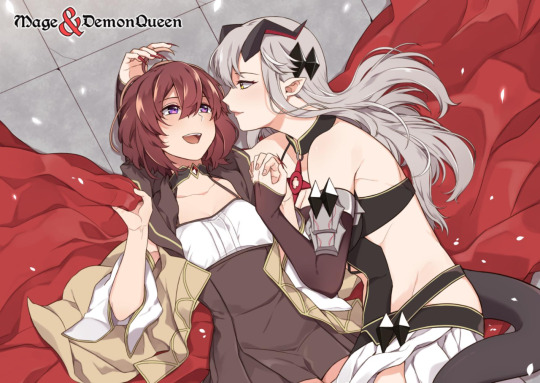
Mage & Demon Queen: is available to read in English on Webtoon
13: Yuri Anthologies
In 2018, Yen Press gave us the first hint of some Yuri anthologies starting to squeak into the West with Éclair, but 2019 threw the floodgates open! New works are coming out in both Japan and the West, featuring multiple artists coming together to create works featuring workplace romance, isekai, first-time stories, and even MARRIAGE!! Additionally, creators released volumes collecting their various short stories, like Rouge Nagashiro’s Eve and Eve, and some series saw multiple artists contribute to an already established world such as in the Bloom Into You Anthologies.
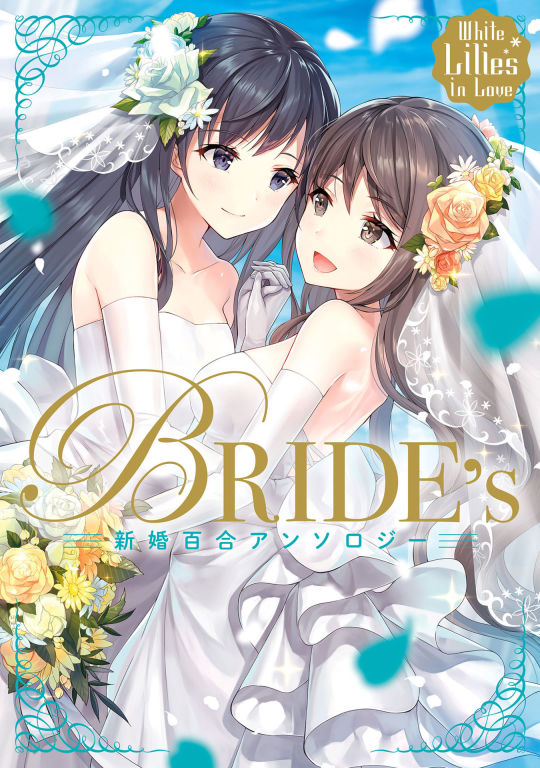
12: SHWD
Sono’s science fiction Yuri doujinshi series, published in English by Lilyka, is everything I did not know I wanted in a Yuri series. It showcases pulse-pounding action as the women of the “Special Hazardous Waste Disposal” fight to take down the horrific Dynamis. It has musclebound beasts of women that exude strength, power, and femininity at all times. And it has a compelling story about overcoming personal conflicts and learning to rely on others.
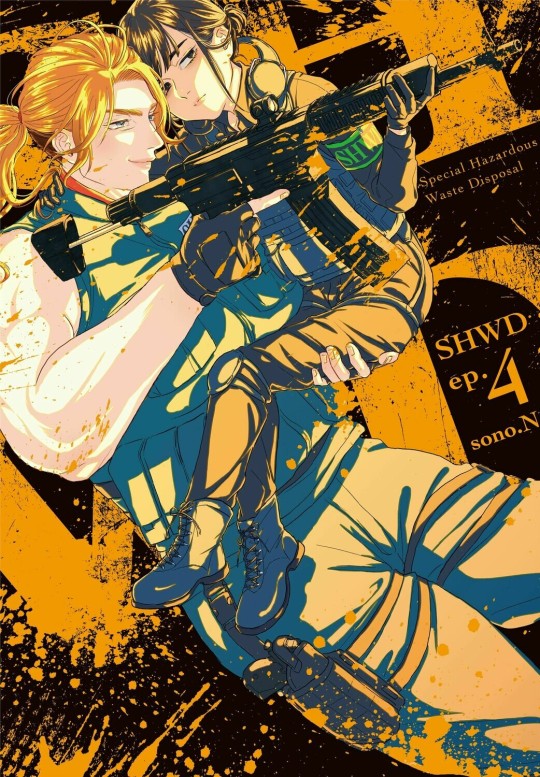
SHWD is available digitally on Lilyka
11: If I Could Reach You
No other series this year delivered an emotional gut-punch like If I Could Reach You. This tragic and beautiful manga by tMnR follows a young girl as she attempts hopelessly to overcome her attraction to her brother’s wife. Everything from the artwork to the dialogue masterfully communicates the devastation and pain that the protagonist Uta feels. It is beautiful and devastating, and I carry every awesome moment on my mind continuously.

If I Could Reach You is available digitally and physically in English from Kodansha: https://amzn.to/36vsYPe
Honorable mention: SQ/Tamen de Gushi/Their Story
2019 was a little bit of a slow year for Tan Jiu’s webtoon, thanks to an extended hiatus, especially when compared to 2018’s triumphant and spectacular storyline. However, small moments of genius like Sun Jing’s father’s phenomenal visual monologue keep this work in peak form top and my heart. I hope that its recent Japanese serialization on Comic Walker help even more people enjoy it.

10: Still Sick
In my recent review, I called this workplace romance a “Yuri manga for Yurijin,” and there is no way I could come up with a more apt description. Still Sick surprised me with its self-awareness, knowledge, and commentary on the genre. It has an incredibly deep story about two complex and layered characters that ignite each other’s passion, in more ways than one.

Still Sick is available digitally and physically in English from Tokyopop: https://amzn.to/2rVRH07
9: Going Beyond Girl Meets Girl
Yuri stories tend to repeat the same story, two girls meet, they fall for each other, they get together, THE END! The past decade or so has finally seen more stories adding sexual elements, in contrast to earlier S works, and some even explored the dating life of two schoolgirls. However, we have recently seen something remarkable: works featuring couples “graduating” (literally or metaphorically) and enter the real world. Series like Citrus, Kase-san, and, briefly, Bloom Into You explore the relationships as they exit the honeymoon phase and get into the meat of lesbian livelihood.

Kase-san and Yamada is available for English preorder: https://amzn.to/2MXnp4w
8: Nagata Kabi
Over the past few years, Nagata Kabi has redefined what the Yuri genre can be. Her powerful autobiographical manga essays My Lesbian Experience With Loneliness, My Solo Exchange Diary, and Genjitsu Touhi Shitetara Boroboro ni Natta Hanashi communicate her experiences with queer identity, mental illness, and alcoholism. No work of fiction could ever hope to reach Nagata’s strength and crushing honesty. Nagata’s manga has and will continue to change readers and the genre for years to come.

My Lesbian Experience with Loneliness is available digitally and physically in English from Seven Seas: https://amzn.to/2MZ7DWJ
7: Bloom Into You
Nakatani Nio’s popular Yuri series Bloom Into You crushed it in 2019. It concluded serialization, ending on an incredibly high note, and dominating the market in both English and Japanese, selling over one million copies (well deserved). Additionally, Sentai Filmworks released an excellent collector’s edition of the 2018 television anime adaption that is now a must-have for Yuri collectors. But my favorite aspect of this series is the spin-off light novel series featuring one of its best characters, which have already begun English release.
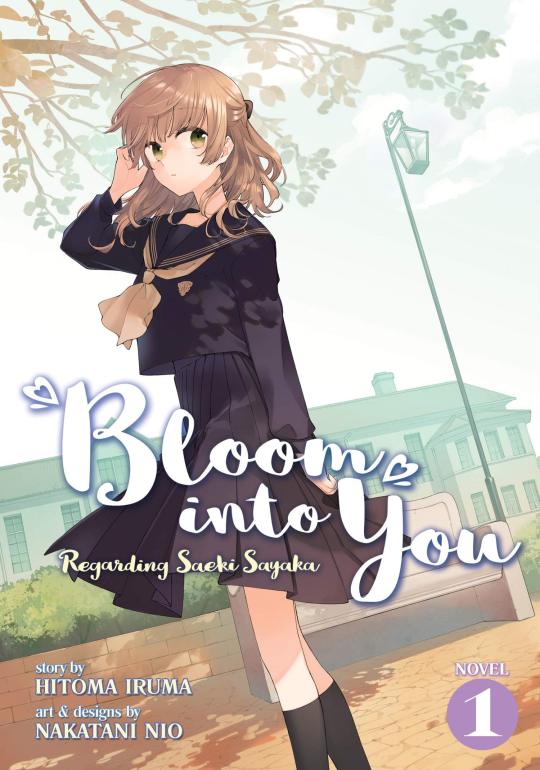
Bloom Into You: Regarding Saeki Sayaka is available digitally and for physical preorder from Seven Seas: https://amzn.to/2SVPVHG
6: Heart of the Woods
When I heard that one of the co-creators of Highway Blossoms, one of the better English Yuri visual novels, was creating his own studio, I was pretty excited. But nothing could have prepared me for Studio Élan's first release, Heart of the Woods, which blew me away. The enchanting adventure full of exceptionally queer characters shattered every expectation I had. I am looking forward to its Switch port and voice acting patch, as well as more titles from Élan.

Heart of the Woods is available for PC on Steam. Switch edition coming later this year.
Honorable mention: Hayama-sensei to Terano-sensei wa Tsukiatte iru
Oui Pikachi’s manga about two teachers navigating a new relationship is one of my new favorites. Everyone is so supportive of the title characters as they stumble their way through an honest and mature love. However, I am only giving it an honorable mention this year, as I am sure it will be on this list next year after Seven Seas releases the first volume in English as The Gym Teacher and School Nurse are Dating!
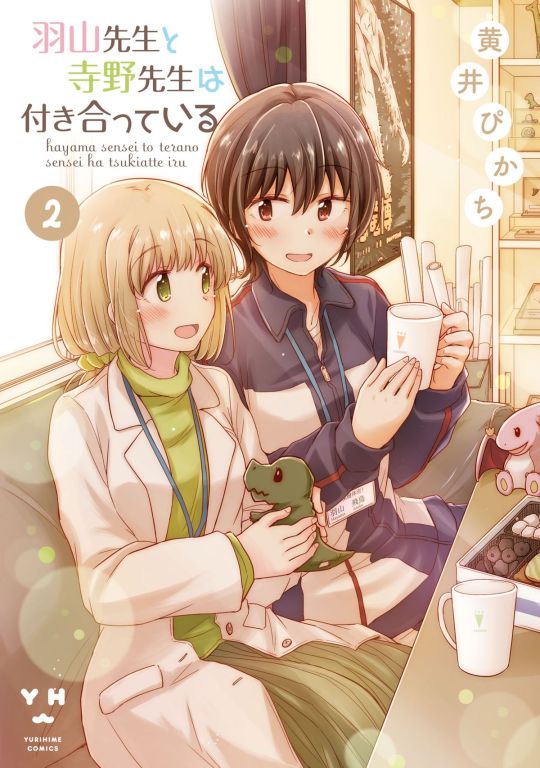
The Gym Teacher and School Nurse are Dating! is available for preorder in English from Seven Seas: https://amzn.to/39JhXMs
5. Sexiled
Ameko Kaeruda’s spectacularly feminist and outrageously funny light novel series Sexiled is could ever ask for and more. I feel in love with its compelling female characters and their riveting battle against the sexist conventions of their society, all of which painfully mirror reality. This work is cathartic, empowering, and so very, very gay.

Sexiled is available digitally in English from J-Novel Club. Physical edition coming later this year: https://amzn.to/35u6NaW
4: Yuri Life
I adore domestic Yuri. Granted, I love a good romance and fantasy, but so many of these stories exist that it feels overwhelming, and sometimes it is just good to sit down and read about two women who love each other living their everyday adult lives in bliss. Kurukuruhime’s Yuri Life, which I have enjoyed ever since it was first uploaded to Pixiv and am so proud to own in print, is precisely that. Nine couples being cute and living together in a variety of humorous, scandalous, and adorable situations. Yuri cohabitation has never been so good! Now, if I could only get some Yuri titles about women raising kids together…
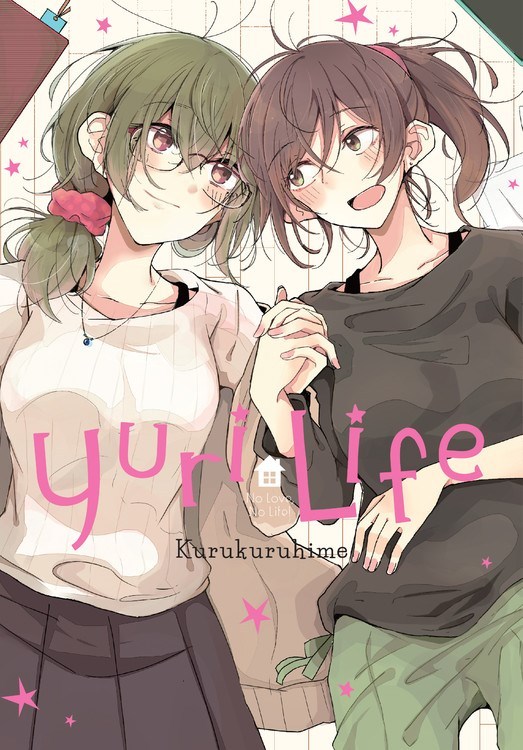
Yuri Life is available digitally and physically in English from Yen Press: https://amzn.to/35stSLg
3: Children’s Cartoons
For the past several years, children’s cartoons and media have slowly begun to allow bits of queer representation onto the screen. While we are still a long way from having Elsa kiss a girl, the small and large victories on children’s television give me hope. Some of my personal favorites include an episode of Nickelodeon’s The Loud House about a lesbian date, a lesbian couple and agender character (using they/them pronouns) in Craig of the Creek, the female protagonist of Twelve Forever developing a crush on another girl, and of course the unbelievable amount of queerness that She-Ra and Steven Universe shove into every moment. I wish I had more series like these when I was young, and I am thrilled that my students get to grow up with them.
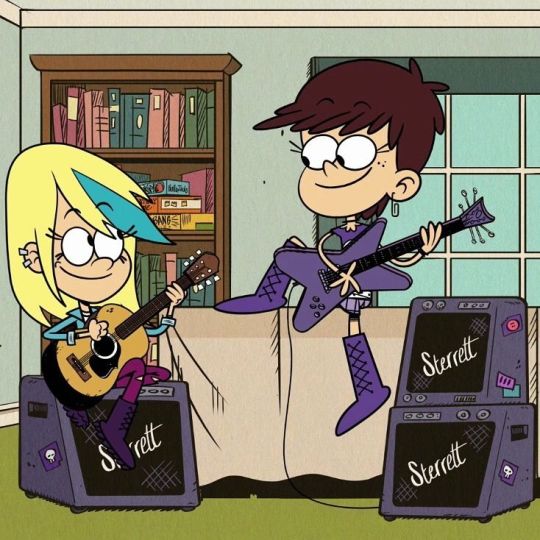
2: Our Dreams at Dusk (Shimanami Tasogare)
Yuhki Kamatani’s Our Dreams at Dusk is easily 2019’s best manga. The incredible story explores many real aspects of LGBTQ identities, gay, lesbian, trans, non-binary, and asexual included, in an emotional and resonating masterpiece. The artwork is stunning and more expressive than words could ever be. I stand by what I said in my review, that Our Dreams at Dusk is the greatest manga I have ever read and wholeheartedly believes that it was deserving of the only 10/10 score I gave in 2019.
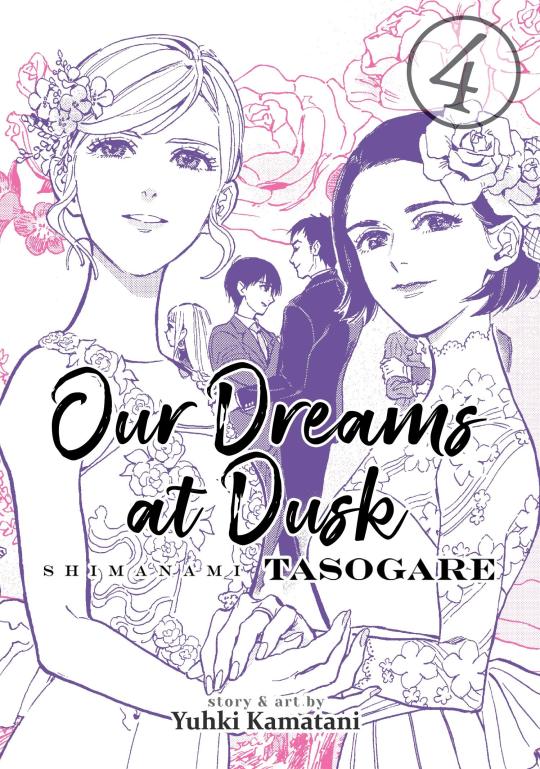
Our Dreams at Dusk is available digitally and physically in English from Seven Seas: https://amzn.to/2s282AE
Honorable mention: ‘The Conditions of Paradise’ Licensed
One of the best moments of this year came out of Anime Expo when Seven Seas announced that they had licensed Morishima Akiko’s Rakuen no Jouken and would be releasing it as The Conditions of Paradise in 2020. Not only is The Conditions of Paradise a fantastic and mature work of Yuri literature, but it is also over a decade old, having been published originally in 2007. This license, more than anything else, helped me realize how far Yuri came this year. Not only is the hottest new series being adapted, but a historic and profound classic of the genre.
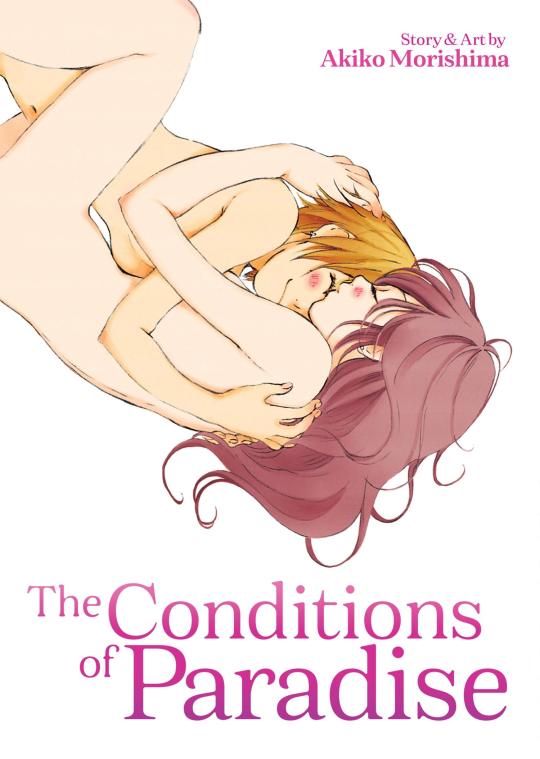
The Conditions of Paradise is available for preorder in English: https://amzn.to/2FjTE9M
1: Yuri Publishers
Not too long ago, it was rare for us to see more than a few Yuri manga releases in a year if any, but now we are at the point where a publisher can do an event announcing five Yuri licenses in a single day! As of this year, all the major publishers, and plenty of smaller ones, are actively licensing, adapting, and publishing amazing Yuri works: Yen Press, Viz, Kodansha, Seven Seas, Tokyopop, Renta, J-Novel Club, and more keep giving us incredible Yuri. I also have to mention the incredible work Lilyka Manga is doing, working directly with mangaka to adapt Yuri doujinshi titles into English, something I would have never dreamed of a few years ago.
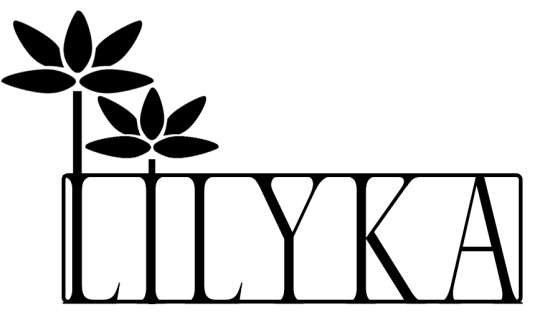
As Yuri enters its second century, we are staring down the rest of 2020, a year that will no doubt go down in current Yuri history. The year will see a record number of Yuri manga releases both in Japan and from licensed series in the West. We are getting several promising anime series like Adachi to Shimamura, Magia Record, Oshi ga Budoukan Ittekuretara Shinu, a Princess Principal movie, and more. I cannot wait to see what this year will hold for YuriMother and the Yuri genre. I hope you all stick with me through it as we navigate the waters of a newer, gayer, and greater world of Yuri.
#yuri#lgbt#lgbtq#lgbtq+#2020#2019#list#essay#news#queer#wlw#gay#romance#manga#anime#video games#gaming#games#bloom into you#their story#the loud house#steven universe#kase-san
3K notes
·
View notes
Text
Weird Fiction/Cosmic Horror Recommends
In a time of general uncertainty and anxiety, one thing that is certain is that weird fiction/cosmic horror has got your back. If you like to combat your growing sense of existential dread by reading about other people’s growing sense of existential dread, this is a list for you. Where texts and shows are available online, I have included links. Where they are not, I have included links to where they are available to buy.
Books
Agents of Dreamland – Caitlin R Kiernan
Government agents, ritual murders, a doomsday cult and a glitch in NASA’s interplanetary probe all feature in this deeply frightening and deftly written novella that takes classic Lovecraftian tropes and expands on them with mesmerising skill.
Wanderers – Chuck Wendig
When a sleepwalking epidemic hits America, those affected head towards a destination known only to themselves. Desperate to keep their loved ones safe, ‘shepherds’ follow the growing group to protect them on their journey. This is an incredibly rewarding read stuffed full of complex characters, apocalyptic horror and a long hard look at human nature.
Winter Tide – Ruthanna Emrys
After the government raid on Innsmouth, Aphra and Caleb Marsh are the only inhabitants of the town to survive the desert internment camps. When confidential, dangerous magic is stolen from Miskatonic University, the FBI are forced to turn to the last of the Marsh’s for help. An evocative and sympathetic novel that takes the antagonists of Lovecraft’s works and paints them in a new light.
The Fisherman – John Langan
This is considered to be a modern classic of the genre and for good reason. It’s best to go into this one as blind as possible so I’ll just leave you with this little quote: "I know Dutchman's Creek runs deep, much deeper than it could or should, and I don't like to think what it's full of."
Carter and Lovecraft – Jonathan L. Howard
A homicide detective turned Private Investigator finds himself embroiled with the last known descendant of H.P Lovecraft, Emily Lovecraft. When deaths that have an eerie resemblance to the writing of Emily’s ancestor begin to plague the area, the investigator finds himself drawn into a world he thought didn’t exist beyond fiction.
Rosewater – Tade Thompson
The first in an award-winning trilogy that blends science fiction into the weird in near future Nigeria. When an alien biodome manifests in the landscape, a select group of people in the surrounding area begin developing psychic abilities. A winding, disturbing tale with an original setting, voice and characters; this is the perfect read for those looking for a fresh take on the genre.
North American Lake Monsters: Stories – Nathan Ballingrud
I am hugely obsessed with this – Ballingrud uses tropes and characters we are all familiar with and uses them to tell stories that shed light on the plight of rural, poverty-stricken America. He is a masterful author with a true gift for atmospheric writing (‘Late summer pressed onto this small Mississippi coastal town like the heel of a boot. The heat was an act of violence.’) and this collection will appeal to fans of Ligotti and Barron as well as those who are unfamiliar with the genre.
The Ballad of Black Tom – Victor LaValle
This is essentially a retelling of Lovecraft’s The Horror at Red Hook (but without the blatant racism, hooray!). A slow burn, cosmic horror noir featuring a who’s who of the Cthulhu Mythos, for those interested in the genre who do not get on with Lovecraft’s writing or the man himself, this is an excellent way to get all the good stuff without the bad.
Anthologies
A Lonely and Curious Country: Tales from the land of Lovecraft
Seventeen stories about Lovecraftian horrors in the most unusual of places. Lots of these work as mini-sequels to Lovecraft’s original stories so this is a good companion for those familiar with his work.
Lovecraft Unbound
As I’ve said before, Ellen Datlow is a powerhouse of anthology editing. Featuring a great spread of familiar mythos faces and more thematic takes on the genre, Lovecraft Unbound is one of the best collections out there.
Book of Cthulhu
There are a couple of these! All feature some of the best contemporary authors writing weird fiction. Quality of individual stories sometimes varies in Lovecraftian anthologies but that is not the case here. The first is particularly good as it also contains stories from older, more obscure writers who are hard to get in print.
Shadows of Carcosa
Twelve short stories that feature everything from the land of carcosa to the traditionally Lovecraftian setting of the cursed hills of New England. All of these are shorts written by classic writers such as Poe, Stoker, Bierce, Chambers and Blackwood.
Lovecraft’s Monsters
Another collection edited by Datlow. This one is particularly fun as it features illustrations, as well as a story by Neil Gaiman. Lovecraft’s Monsters is amongst my favourite of the anthologies as it is based solely around the creatures that crawl and squirm through the mythos. It’s also available as an audiobook!
Children of Lovecraft
Fourteen short stories including authors like Stephen Graham Jones, Orrin Grey, Caitlin R. Kiernan and Livia Llewellyn. Full of body horror, dread, surrealism and one of the best opening sentences to any short story.
She Walks in Shadows
A monumental, fascinating collection comprised of exclusively female authors. Offering a long overdue look at and development of the female aspects of the mythos, this collection gives a voice to the previously unheard. For those looking for a diverse, original and often deeply disturbing reading experience, this is your anthology.
Available online for free
The Lovecraft Ezine has a great archive here of all its previous issues
Weird Fiction Review is an excellent resource for online fiction – both excerpts from books and stand-alone short stories.
The Online Books page has direct links to the issues of Weird Tales magazine published between 1923 – 192.
TOR.COM is an amazing resource for all kinds of science fiction and fantasy shorts. This is a link specifically to Lovecraftian fiction. There’s also lots of interesting things to read under the tag cosmic horror here.
Graphic Novels
Fatale - Sex, violence, cults, cosmic horror, imaginative period settings and gorgeous artwork. Fatale is one of the best comics set in the mythos out there.
Locke and Key - Many of you will be familiar with Joe Hill and Gabriel Rodriguez’s hugely popular (and now televised) series focused on a house above a portal to the plains of Leng.
Harrow County - Creepy, rural-based, folk horror series centred on a young woman who finds herself to be joined to the forest and the land in ways she could never have imagined.
The Squidder - A postapocalyptic Lovecraftian mess, I have included this because it is worth buying for the artwork alone. Ben Templesmith is an acquired taste but an incredibly talented illustrator whose work is uniquely suited to the mythos.
I have talked about these several times before but it is always worth checking out I.N.J Culbard’s graphic novel adaptations of Lovecraft’s stories, as well as the two anthologies that were released several years ago.
***
Films – Cosmic Horror
I have linked to the trailers for each of these, some are classics you will know, some are new.
The Colour out of Space
Die Fabre
The Dunwich Horror
The Endless
Event Horizon
The Void
Europa Report
Black Mountain Side
Films – Folk Horror
The Ritual
They Remain
The White Reindeer
Night of the Demon
Apostle
More generally, some good online resources for old/weird/out of print books are
Project Gutenberg – an online library of over 60,000 books in the public domain
Internet Archive – a great resource for obscure books (particularly historical)
Europeana – items from Europe’s galleries, museums, libraries and archives
Digital Public Library of America – similar to Europeana, but for America
Classic Literature – lots of 19th century gothic goodness in particular, but great for all the classics too!
And when it all gets too much and you feel like being your own creeping dread, Here is a link to a fun game where you can be the rats in the walls.
#this is an extremely long post y'all my apologies#lovecraft#weird fiction#book recommends#eldritch reads#cthulhu mythos#film recommends#graphic novels#lovecraftian#hp lovecraft
593 notes
·
View notes
Text
Exclusive Interview with Sheree Renée Thomas, Author of Nine Bar Blues
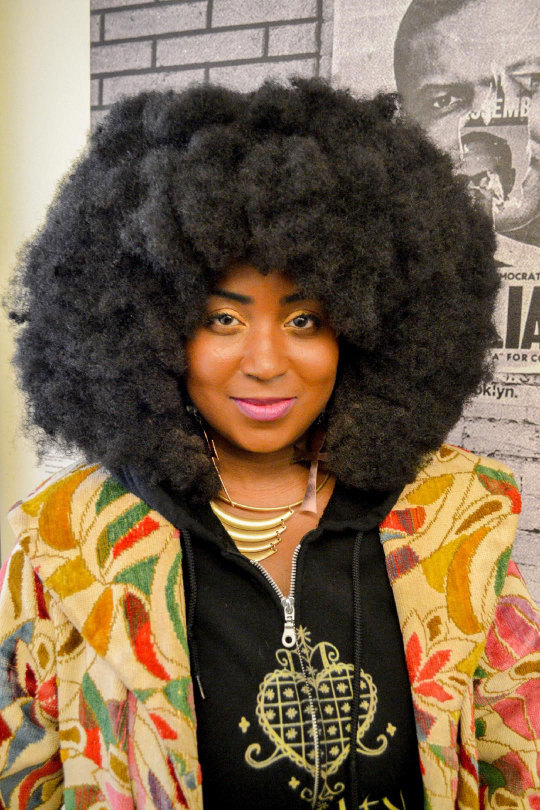
One of our booksellers, Caitlyn Wild, had the amazing opportunity to conduct this longform interview with author Sheree Renée Thomas. Her newest book is Nine Bar Blues: Stories from an Ancient Future, published by Third Man Books. Sheree is celebrating her book along with her Third Man “label mates” Alison Mosshart and Robert Gordon (who also have new books out) in our City Lights LIVE events series on Wednesday, October 21.
***
Caitlyn: This book is gorgeous on the inside AND the outside. This is one of my favorite covers of 2020, have to say. As I'm gazing wistfully at it here I see the subtitle, "Stories from an Ancient Future". Could you speak about what that phrase holds and conjures for you? Sheree Renée Thomas: Thank you! I wanted the cover for Nine Bar Blues to offer a visual clue to some of the characters, natural (and unnatural) landscapes, and themes in the stories. Third Man Books did a wonderful job of creating that sense of wonder and the verdant richness (cicadas, Egyptian gods, the moon, aliens, vines!) I was hoping for.
The subtitle, “Stories from an Ancient Future” is my riff on the idea that if humanity continues onward, we’ll someday reach a point where even our imagined futures are ancient. Some of the stories in the collection are set in the near future, alternate futures, the present, and the past. What would life be like if you existed in an ancient future? If time is relative, there is always a place where we can look back at ourselves (or our imagined selves) and see the grand sweep of time. What things remains the same, what falls away, is erased and remade again? The ancient future contains some of the wisdom of our past and some of our hopes for the future. It also contains our mistakes and fears. Will we be better off then, in this imagined future? Perhaps, at least I hope so. But that depends on what we carry with us and how well we learn from the lessons of the past. For me, it’s a blending of Ray Bradbury’s Martian Chronicles and the West African philosophy of Sankofa.
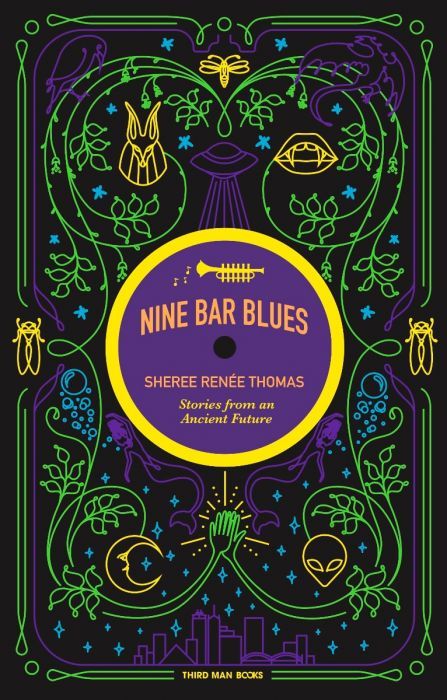
The story that really stayed with me in this collection was "Head Static". It put me in an altered state! I felt like I was watching the earth as it was being created, the deep gods and archetypes of our psyches emerging from the hum of the universe before my eyes, but in reverse. In short, I loved it! Could you tell us about the inception of the character in that story, Claire, and explain how she came to be in your mind and then on the page? That makes me so happy because Claire was one of those characters whose journey really haunted me. When I began writing her, I knew who she was but not why she was, or rather, how she had come to feel the way she did. Music became a way of thinking about the things that people share in common, around the world, throughout time. It is one of our greatest forms of expression. And music contains our deepest thoughts and observations on the world. But our culture is so obsessed with the cult of celebrity, in search of the next great thing. We worship youth and novelty, often at youth’s expense. There’s this constant drive for innovation and acceleration, while holding onto the dream of an endless life span. At what cost? To what end? Writing “Head Static” was a way for me to think about some of these ideas while exploring that deep musical connection. On October 21 we are excited to host you and two of your fellow Third Man Books authors, Alison Mosshart and Robert Gordon. Third Man also publishes another of my favorites, Janaka Stucky. As a reader I'm consistently enraptured with the authors and books they publish. I'm curious as to what the Third Man experience is like from the author's side? It’s been pretty exciting! First of all, if you ever get a chance to visit Third Man Records, go immediately because the space is just amazing. I don’t know how to describe it. It’s like a cross between Tim Burton and Ed Wood with a little Willy Wonka mixed in there? Fantastic design throughout and um, Jack White. Yeah, Jack White! Working with Chet Weise and the Third Man Books/Records team has been as close as my non-musical self has ever been to being in a rock band! There is a lot of good energy, great ideas, and collaboration, and the team is insanely supportive and creative. Between the kickass writers—poets, fiction writers, creative nonfiction—there’s a great deal of talent to just vibe with and connect. My fellow press mates are always working on new wonders, the kind of work that impacts the world—and that’s inspiring.
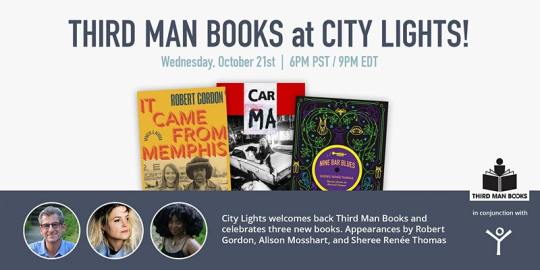
You are the first Black author to receive a World Fantasy Award for the groundbreaking collection you edited, Dark Matter: A Century of Speculative Fiction from the African Diaspora, which was published in 2000. (HELL YES). In another interview, you said you were inspired to put the book together because you were shocked it didn't exist yet. In 2020, is there a book you are shocked that has yet to be published? What books that have come along since 2001 are you glad about? There is at least one marvelous book that I do hope to see in the world before I roll out, and there are a couple of others that seem like their time has come, industry-wise, so we shall see. Back in ’98 when I was thinking on what would eventually become the first volume of Dark Matter: A Century of Speculative Fiction from the African Diaspora, I didn’t set out to create a groundbreaking project. I literally was just looking for more Black speculative fiction to read for fun, and when I didn’t find it in the bookstores, its absence puzzled me. With as many different anthologies that make up the genre, I was surprised that it hadn’t been done before. I’m really grateful I had the chance (and the courage) to do it. It’s been quite a journey! Since that first volume and the second one, Dark Matter: Reading the Bones, that came out in 2004, there have been many, many wonderful amazing books that pretty much put away the old arguments about Black writers not reading or writing this work. One book that I reviewed around the time I was working on the anthology was Nalo Hopkinson’s Brown Girl in the Ring. That novel felt like a game changer to me, because Nalo’s writing got us all so excited about the cultures and worlds we had not seen often in science fiction. She achieved this in a magical way that, while offering all the things we love about speculative fiction, rang true with a rootedness in Afrodiasporic culture. It didn’t feel like she was translating to us. Her writing, storytelling, and world building felt natural and true to itself. Today you could have a whole library of Black speculative fiction (and the scholarship that examines it), and that is beyond thrilling for me.
Between the diverse works of N.K. Jemisin, Andrea Hairston, Tananarive Due, P. Djèlí Clark—they cover a lot of imaginative ground--and a ton of exciting YA authors I cannot even begin to name, readers have a lot of new work and new voices to explore. It’s just an exciting time.
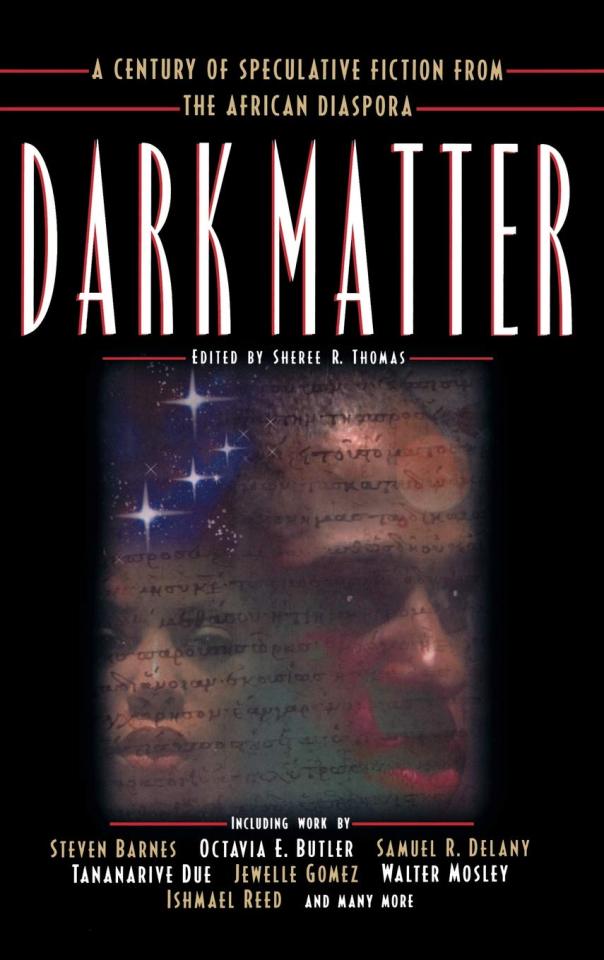
Finally, if you owned a bookstore or small press, what would it be called and what would your bestseller or focus be? I’ve been jotting down bookstore names for years! Here are a few: Beloved Books (this was invented during my Toni Morrison phase), focusing on the books people can’t stop discussing and all of our childhood favorites, too. Echo Tree Books (named after one of my favorite short story writers and poets, Henry Dumas, featuring all fantasy, science fiction, horror, and such).
Haint Blue Books (so I can paint every single wall the most stunning shades of blue, focusing on excellent fiction and world folklore with tons of poetry because sometimes, sadly, people be sleeping on the poetry, lol. Don’t sleep on the poets!). And my favorite, All Y’all Books (Southern lit and more! Plus a healthy selection of regional lit from other parts).
I love the last one the best because I can just hear folks saying, “You know you can get it at All Y’all Books!” or asking, “Where did you get that?” “Girl, at All Y’all’s Books. They have out of print and rare books, too!” Authors can say, “I’m going to be reading at All Y’all’s Books.” You can’t help but smile when you say that!
3 notes
·
View notes
Text
i have time to kill and a brain that needs to be distracted from the looming void of the pointlessness of life so here is an ENTIRE ask meme (part 1)
What book are you currently reading?
A bunch of them, as always. I’ve been dragging myself chapter by chapter through little women for like a couple of months now (i really like the prose, i’m less than convinced by about half of the subject matter and I know Louisa May Alcott likely had the same opinion), There’s a bullet journal guide that I’m forever putting on hold because sigh there are reasons why I need a bullet journal. I’m re-reading The Scum VIllain’s Self Saving System, mostly because the donghua was excellent and gave me cravings. I’m about a third of the way through a halloween anthology and i wasn’t into the latest story so its been like that for a while. I’ve read a couple of chapters and pages each of The Queen of the Tearling and Evensong’s heir respectively and I haven’t gotten back to them but I also don’t want to drop them because they are fine so far. I;m halfway through mexican gothic and I like it but it’s a bit slow-moving so I’m getting twitchy. I’m also about halfway through this segregated magic system urban fantasy thing which would be really good if 90% of the dialogue wasn’t exposition and I have some critique notes for the author about that.
What book did you recently finish?
Another danmei webnovel. And another transmigration novel. This one was both. There was some interesting worldbuilidng and character stuff in the beginning and then it dropped most of the plotlines and devolved into sex scenes I now know how Shen Yuan felt when he was reading proud Immortal Demon Way because SO MANY dropped plot points guys so many.
What’s a book that’s been on your to-read list for a long time?
Rhythm of War? Hopefully I don’t approach this with excitement that fizzles out before I actually start on it like with Oathbringer. I don’t think that’s gonna be the case but I cannot predict the vagaries of my mood reading.
What’s the next book you’re hoping to read?
Eh. Probably RoW again. I do want to read Dawnshard before I read RoW but I’m not entirely sure if that’s going to be possible. RoW takes priority as of now.
Is there a book you own, but aren’t planning on reading?
*gestures vaguely at shelf full of classic novels I am probably never actually going to finish* People keep getting me these things because I “like reading more than anything else” and reading clearly means reading classics.
What was your favourite series as a kid? Would you still read it now?
Animorphs! And yes. I periodically re-read random books from the series for kicks. Not all of it holds up well but enough does to make it a fairly enjoyable experience.
What’s your favourite series now?
I don’t actually do favourites anymore because I’m indecisive and there are way too many metrics to calculate and sometimes I like different books for very different reasons.
Fantasy or sci-fi?
I like both, but I generally prefer fantasy. That said I’m more interested in the applications of weird magic/tech and social consequences than I am in anything else; which means I adore sci-fi like say- The Vorkosigan Saga and Imperial Radch while disliking more standardized/hero-focused fantasy like The Faithful and the Fallen (I STILL DON’T KNOW HOW PEOPLE LIKE IT). It’s a spectrum.
I think someone once mentioned on this very site that they liked fantasy which took a scientific approach to magic and sci-fi which took a magical approach to science and you know what I kinda feel that statement.
What’s a book you want to buy?
Fence: Disarmed. There are disaster gays everywhere.
Have you ever judged a book by its cover?
I've definitely decided to read a book purely because of the cover. Sometimes it works out and sometimes it doesn’t. Same with book titles.
Have you ever bought a book because of who the author was?
I have a small list of auto-buy authors I scream about all the time so Yes. Is Horror not generally my genre but is T. Kingfisher writing some weird horror shit? I’ll take it thank you very much.
If I do find an author I like I generally go through their entire backlist because while quality may vary between earlier and later books (*coughSANDERSONcough*) there are repetitive motifs/tropes I really enjoy which i think the author also enjoys.
Have you ever read a celebrity memoir? If so, whose was it?
Nah. I’ve probably tried to read a couple marketed as funny but I didn’t find them very funny so I gave up. I do have Know My Name by Chanel Miller on my to-do list but I don’t think that qualifies as a celebrity memoir. Oh, and I suppose I’ll get around to reading Trevor Noah’s memoir eventually. Or Bassem Youssef’s.
Are you a fan of autobiographies?
I think that probably depends on the autobiography in question. I remember reading the first part of Gandhi’s autobiography and thinking “wow you are hella judgemental, dude” before I got anywhere hear the Independence movement stuff. I remember starting Booker T Washington’s Up From Slavery with every expectation of giving up halfway through and then powering through it in like a day because it was that good. So. //shrugs
Fiction or non-fiction?
Fiction for long-form stuff and non-fiction for short form stuff. I struggle with short stories, but I can breeze through essays and articles. On the other hand, give me a non fiction book and I’ll brood over it for seven years like I’m trying to hatch a basilisk.
Favourite fiction genre?
I usually say fantasy but a more accurate term would be speculative fiction because I like “how does X change affect society” stories a LOT.
Favourite non-fiction genre?
History (caveat: no biographies, please- just more anthropology-like history) and science. And I do mean science, not technology.
Historical fiction: yea or nay?
generally yea but it really depends on the author and the subject matter. I’m not all that invested in monarchy-based historical fiction (monarchy based fantasy fiction i’ll take), for example. And I really like survivalist fiction so historical survival is a big win in my book.
Do you read the book or watch the movie first?
Ha. Watch a movie? What do you take me for a philistine? (I will however, quite possibly watch a animated series before reading the book it’s a thing.)
Paperback or hardcover?
Paperback. I’m hell on hardcovers. The state of my copy of Goblet of Fire would make anyone with an ounce of sympathy for books weep.
Do you read e-books?
Almost exclusively, at this point.
How many bookshelves do you have?
Physically, not that many. Just two? Everything is crammed in two layers deep though.
How do you organize your books?
Author (Firstname, Lastname) > Series > Series Position. Nonfiction is sorted either by Topic (I HAVE NOT ORGANIZED THIS SUBSECTON WELL ENOUGH IT PREYS ON ME CONSTANTLY), author names I recognize, or books in a series.
Do you prefer borrowing books from friends, borrowing books from a library, or buying them? How willing are you to lend your books to other people?
I guess buying them if I really like the books? I’m a compulsive re-reader. I don’t really like borrowing books from people because I get stressed about forgetting to give them back. I do like lending books to people though. If I have a backup copy in ebook format, anyway.
I don’t really have any libraries I can borrow non-Classics fiction from alas.
In what condition do you keep your books?
“it’s Okay I guess” to Poor. A couple are in “WHAT MANNER OF HIDEOUS BEAST RAVAGED YOU” territory. I need to cover books or I inevitably start wearing down on the corners it’s like i exude an aura of non-lethal but constantly-eroding destruction that affects everything I come into contact with I thank my electronics from the bottom of my heart for their service.
What’s the biggest book you’ve ever read, and how many pages did it have?
I’m reasonably sure it’s this webnovel called Rebirth of the Malicious Empress of Military Lineage because DEAR GOD IT TOOK ME WEEKS even when i was near-constantly reading I think it was even longer than Tian Guan Ci Fu/Heaven’s Official Blessing but idk how long bc webnovel and the pagecount (for the whole novel) is not listed on Goodreads.
5 notes
·
View notes
Note
Hey! Long time reader, first time asker but I read your post yesterday about supplementary material enriching experience. I’ve seen all the movies, I’m loving The Clone Wars and I enjoy playing Swtor but that’s all I have experienced. Do you have any recommendations as to where to start with supplementary material? Are the graphic novels you reference on that marvel comic subscription do you know? Thank you for your posts, they are always so interesting!
Hi! Thank you for the kind words, I’m glad you’re enjoying the blog! And I love doing “where to start” posts! Keep in mind that a lot depends on what you happen to like (if you’re more of an OT fan or a PT fan or an ST fan, if you like certain characters more than others, etc.) but I think the basic places to start when moving on from the movies are:- The Clone Wars TV show. As you’ve said, you’re already watching this one but it’s still my #1 recommendation, because it sets up so much of the galaxy and the way things operate in the Republic and is just really good. Finish this one first, as it introduces you to so much you’ll need down the road–a lot of the Jedi characters that will then break your heart when you watch Order 66 happening in Revenge of the Sith, getting invested in Ahsoka Tano and her role in Anakin’s life, getting more time spent with characters like Obi-Wan Kenobi and Padme Amidala, some trippy arcs like the Mortis arc that are fascinating for Force Woo, and a lot of stuff will come up in other shows, comics, and books!- Star Wars Rebels TV show. While it’s about an entirely new group of characters, it has a lot of recurring familiar characters–like James Earl Jones reprises his role in voicing Darth Vader, you learn the fate of Ahsoka Tano here, you get to see some of the clones again, you get a look at what it’s like for Jedi under the thumb of the Empire, you’re introduced to the Inquisitors, you get to see the politics of the Rebellion as the show goes along, you get a better look at Mandalore, etc. This is another show that will help form the foundations of other stuff.- Star Wars Battlefront II game. You can play it or just watch a movie version of it on YouTube. Yeah, the game got a lot of crap for the shit EA tried to pull with it, but it’s turned into a really great piece of media and the story itself is absolutely fantastic and will only take about 2 hours to get through, but a) it’s a great story with great characters (I LOVE IDEN VERSIO SO MUCH) and b) it does a great job at showing a lot of what happened after Return of the Jedi but before the Empire truly gave up. This establishes a lot of the final fight stuff, like the Battle of Jakku and its importance (aka, that’s all those ships that Rey is scavenging at the beginning of The Force Awakens) and what Operation Cinder is and the epilogue helps lead into what the First Order is.- The Star Wars titular comic + Darth Vader volume 1 (by Kieron Gillen) comics. These two are meant to be read concurrently, so I recommend them together, and they do an absolutely incredible job of filling out the space between A New Hope and Empire Strikes Back. They’re telling fantastic stories (including some really powerful stuff about Vader finding out the name of the Death Star pilot is Skywalker) while also giving some really great insights into the characters, adding depth to the story of the movies, and made me fall in love with the characters all over again. This Vader tends to be a little more mysterious, Gillen liked keeping the mystique to him (which appeals more to some, so if that’s your jam, read these first!), the feeling is very much in tune with the original trilogy in that sense. Same for the heroes, they feel very OT!- Darth Vader: Dark Lord of the Sith by Charles Soule comics. You can read the Vader comics in either order, but I generally like suggesting this one to go second (release order is always good, imo) despite that this is my favorite of the comics. Set not long after Revenge of the Sith, this is a comic about Darth Vader adjusting to his new life and about the bigger, overarching story of the psychological look at a character who cannot admit what he’s done wrong. On the surface, it’s about him hunting down Jedi and trying to raise his wife from the dead, but in the macro sense, it’s about this guy who cannot admit that he had other choices, even when the Force is literally throwing those other paths in his face. Great Vader content for him being powerful and terrifying, while also being an absolute human disaster garbage bag.- Age of the Republic comics by Jodie Houser. If you like the prequels at all, these comics are stellar. There are eight of them, four for the main heroes, four for the main villains, and they’re a single issue each, where there’s a short look into their lives at various points, all which illustrate really thoughtful things about the characters, whether through their actions or even sometimes comparisons with other issues in the series. (ie, reading the Obi-Wan one and Jango Fett one really highlighted how each of them dealt with this young person they were taking care of.) They were just REALLY GOOD STORIES, too.- Star Wars Adventures by IDW Comics. These are cuter stories and set all across various eras, from the PT to the OT to the ST to occasionally other areas, but they’re always just absolutely CHARMING. They’re pure delight to read, they tend to focus on moments that are just really fun, so it’s easy to think of it as a kids’ comic, but instead I think they work best at showing some of the more hopeful moments of Star Wars without being too fluffy.- Poe Dameron by Charles Soule comics. These are SO GOOD, they really add so much to Poe’s character and they also do a great job of fleshing out that time between the New Republic still working to stabilize itself and when we know the First Order is coming. But mostly it just really makes you like Poe as a character, it captures his sense of charm and swagger while giving him an actual character arc, as he learns to be a leader.- Kanan: The Last Padawan comics. You need to see Rebels first (or at least the first two seasons, enough to make you care about Kanan as a character) but then this is a gorgeous, beautifully told story. It’s half about the current days with his new found family the Ghost crew (the cast of Rebels) and half about his history as a Padawan in the Jedi Order, how he was apprenticed to Depa Billaba, how he watched her die, how he had to live in the galaxy that wanted him dead just for being born the way he was, how he was being hunted for it, and how he survived. It’s really, really good!- Forces of Destiny animated shorts. You can find them all on Disney’s YouTube channel, they’re these 2-3 minute long stories about the women of the galaxy far, far away (with occasional appearances by others) and they’re pretty light-hearted fare, they’re meant to impart messages to kids or just be bite-sized content, but they’re pretty wonderful and it’s nice to see the women of SW get some attention.- From a Certain Point of View book. For the 40th Anniversary of A New Hope they put out an anthology of short stories, telling the various points of view of different side characters and adding depth to everything that was going on. Not all of them are super great, you can feel free to skip ones if you’re getting bored, but there are some MUST READ ones, especially the Qui-Gon, Yoda, and Obi-Wan ones. And the Admiral Motti story had me in absolute tears from cry-laughing while reading it.- Bloodline by Claudia Gray book. It’s a really good Leia story, but it’s also a book that does a lot to cover what’s going on with the New Republic still struggling to establish itself, why Leia isn’t part of it by TFA, and more on how the First Order came to be and why people stuck their heads in the sand about it.- Thrawn by Timothy Zahn book. While there’s some dissonance between Zahn’s version of the character and the character from Rebels, I think you can make them fit together, and this book really is one of the best of canon material. It’s fun and zips right along and introduces some new characters and sets up some really interesting backstories and just fleshes out the Imperial stuff and gives us Eli Vanto. ALL THINGS I LOVED.FINALLY: The above is aimed at a general list of things that I thin pretty much anyone would enjoy, it’s meant to cover most of the bases as best I can, but if you have a favorite era or a favorite character, feel free to run straight to anything that involves them. There’s a lot of good Legends stuff (as always it’s hard not to recommend the Revenge of the Sith novelization or Wild Space, but that’d just muddle the line between canon and Legends), but I’m sticking with canon right now because it’s easier and there’s so much good stuff and it’s less confusing that way.All the comics are available on Comixology (and there’s never been a comic I hated by any means, though, admittedly some of the mini series can be kind of bland, anything that ran for at least 20 issues is a good bet, and most of the comics are THE BEST of the supplementary material), and if you don’t mind waiting a couple of months for Disney+ (or Googling for streaming sites) the animated properties are all really worth watching. Sometimes they take a bit to get going, but I’ve fallen in love with every single one.These might not end up being your favorites (some of my favorites–like the Aftermath books or the Join the Resistance books–are ones that I wouldn’t put on a list for new-to-supplementary-material fans, because they’re a little too distanced from established characters) but they’re great places to start getting a feel for whether or not you like this kind of thing! :D
33 notes
·
View notes
Text
Books - January 2020
I love babbling about books, and I always keep meaning to keep up some sort of record of the ones I’ve been reading. So let’s start now! Watch me completely fail to keep this up for the rest of the year hohoho
Eagle’s Honour - Rosemary Sutcliff
A volume of two little novelettes set in Roman Britain, displaying Sutcliff’s usual mastery of atmosphere and characterisation (though obviously not to the scale of her full-length novels). A Circlet of Oak Leaves is a rather sad story about loss, bitterness, resentment, and the cost of living a lie. Eagle’s Egg, on the other hand, is a very nice one which somehow mixes a sweet romance with Agricola’s Caledonian campaigns (ikr?!), and features a hero who manages to quell a mutiny by - in his words - making a bad joke at the right moment. (Quintus is My Kinda Guy! <3)
Some Must Watch - Ethel Lina White (aka The Spiral Staircase)
A rare case of the film being better than the book! I nearly put this down after the first few chapters, as the dry, expository style was pretty awkward. There was a lot of “Little did she know that this seemingly innocuous incident would be Really Important later…” which had the effect of defusing the tension, rather the heightening it, and depriving the reader of the fun of trying to pick out the real clues from the red herrings.
It’s also been a long time since I’ve read a book so thoroughly hostile to its female cast. Of course I try to take a book as a product of its time, but even for the ’30s, the misogyny felt overwhelming. The female characters are despised for being pretty or ugly, stupid or clever, flirty or frigid, young or old… (Somehow this sort of thing is even more depressing when it’s a female author.) The only exception, as far as the narrative voice is concerned, is the protagonist herself, who I guess is supposed to occupy some sort of happy medium, but unfortunately this reader found her irritating as hell, and a shining example of Too Stupid To Live. (Honestly, until now I would never have imagined that making a female protagonist literally voiceless could ever be an improvement on the source material, but somehow The Spiral Staircase managed.) *sigh* There’s no winning sometimes.
Swallows in the Spring - Rosemary Sutcliff (short story)
Another atmospheric short story, this time centred on two veterans of the Ninth Legion after its disappearance (picking up the idea Marcus posits in EOTN that there must have been some of the legion who didn’t march north that last time for one reason or another). Short, but haunting. I’d say both it and Eagle’s Egg are worth checking out for fans of Eagle of the Ninth, as both add a bit to the lore of the Hispana’s story in the Sutcliff!verse.
The Boy with the Bronze Axe - Kathleen Fidler
This is regarded as a bit of a children’s classic, and it’s one I’ve kept meaning to read for years. Now that I have... eh. :\
If you’re looking for something that sets out to recreate daily life in the Neolithic, you could hardly do better. The book is rich in detail, and you get a real sense of Stone Age people's resourcefulness at feeding, dressing, ornamenting, arming, and indulging themselves from the natural world around them (absolutely nothing was wasted!). Hunting and farming techniques are described, and rituals and ceremonies recreated from the existing monuments and artefacts we still have.
But apart from that, character development is basically nil. By the end of the book, I found myself rather sympathising with the couple of designated bad guys who were sick of Tenko the Bronze Age Gary Stu. A lot of the dialogue is stiff and stilted, and some sections - like the blow-by-blow description of floating a tree out of a cave at high water - made my eyes glaze over. I can’t really criticise a book for following the accepted archaeological theories of the time it was written, so I won’t, but even then there were still some things that made the head tilt. Even accepting the idea that Orkney at this time was remote and cut-off from mainland Britain, it was hard to believe that the people of Skara could have next to no knowledge of what was going on in the other islands. Some of those straits between them are very narrow indeed, and would have been easily navigable in a small hide boat. I’d say this is probably a book I would’ve enjoyed much more if I’d actually read it when I was a kid - only I remember finding another Fidler book, The Desperate Journey, pretty dull when I read it in primary school, despite the subject matter being extremely relevant to my interests, so I think I’m just plain not a fan.
The Fugitives - Rosemary Sutcliff (short story)
Another short, evocative little slice-of-Roman-life. It’s quite like EOTN in the respect that the protagonist, Lucian, is a young boy who has been physically disabled and is only just coming round to the acceptance that his life is going to have to take a different course than planned. (His father is Pilus Prior of a legion. ’Nuff said.) I felt the thematic link between Lucian and the deserter he ends up helping was actually pretty tenuous, but the characters themselves were all pretty engaging, especially the friendly young centurion who heads the search party. He reminded me a bit of Flavius from The Silver Branch. :)
Wandering Ghosts - Francis Marion Crawford
I’d already two of the stories in this collection - The Upper Berth and The Screaming Skull - but I enjoyed them so much I read the whole thing. They’re definitely the best of the bunch (The Upper Berth is, I gather, supposed to be Crawford’s best one, but for my money The Screaming Skull is even better), but I also really liked Man Overboard! and For the Blood is the Life. Crawford has a deft hand at mixing menace and humour (a bit like M.R. James in that regard), and a lot of the stories here have a very nautical character, which obviously pleased me. :) The only one I’m not crazy about was By the Waters of Paradise, which started off great, meandered on for a good long while, then just sort of... puttered out.
Winter Tales - George Mackay Brown
Weirdly enough, though I’ve read several of GMB’s novels and short stories, this is is actually the first full anthology of his that I’ve read. He’s always a delight to read for the beauty of his prose alone, and these stories are no exception. As always, he’s at his very best when he’s describing the rhythms of Orkney life, whether that’s in the 11th, 18th, or 20th centuries, and his sense of place and character is always gorgeous.
As is the way with anthologies, some of the stories I loved, others didn’t do much for me. My favourites from this collection are The Paraffin Lamp, The Woodcarver, and The Fight in the Plough and Ox (possibly because they were the most humorous?). I also have to give a shout-out to Lieutenant Bligh and Two Midshipmen for its thoughtful characterisation of William Bligh.
There’s a lot of overtly Christian symbolism throughout the stories, though it never quite matches the lyrical, meditative power of his novel Magnus, which meant quite a few of the stories left this stone-cold heathen going, “So… what was the point of that, then?” That said, I very much enjoyed his modern AU take on the parable in The Road to Emmaus. There’s a section in Magnus where he does something very similar, describing the civil war between the two earls almost as if it were a BBC report from a modern warzone, and it was an interesting echo of that. (I’m not sure which one was written first.)
4 notes
·
View notes
Text
january book round up
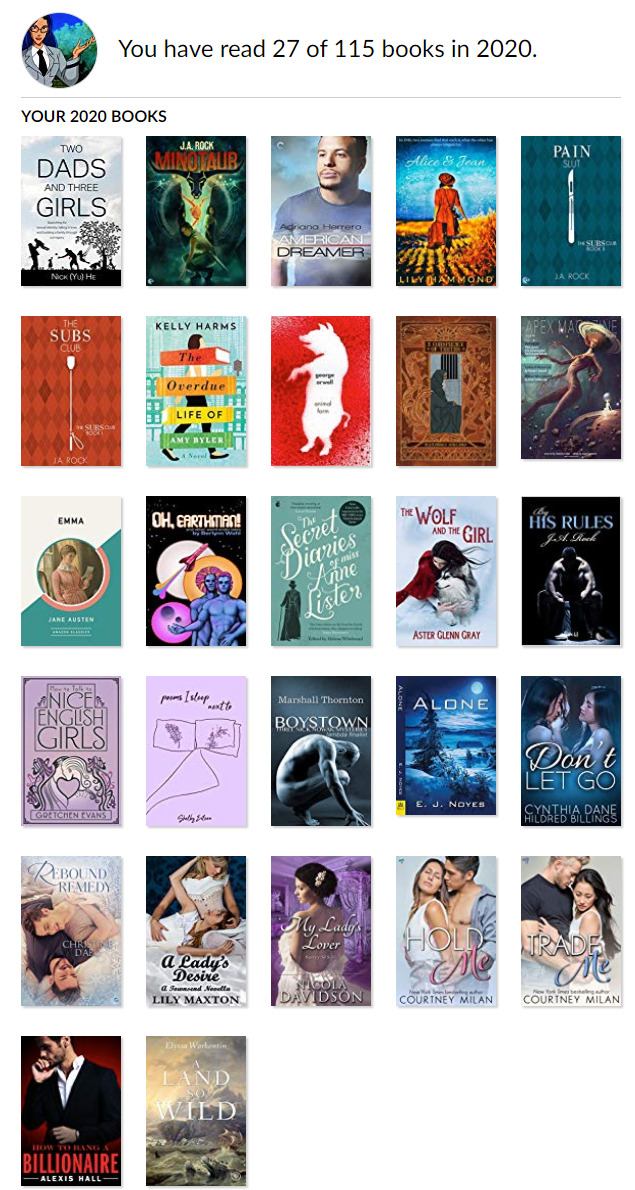
27 books this month! the most i’ve read in a month in quite some time, and a good start to the year. a couple days late because i’ve been feeling a bit meh. i doubt i’ll be able to read this much at any point this year. but it’s nice to get a good strong head-start on my yearly goal. a mix of audiobooks and e-books so far.
a land so wild - elyssa warkentin ⭐️⭐️⭐️⭐️ a really lovely epistolary/found media m/m romance story, set during the 1840s, about a ship captain and a naturalist trying to chart a northwest passage in the arctic, and find a ship that was lost five years ago trying to do the same thing. very beautifully told, with lots of emotion that you’d think would be lost because of the mode of storytelling.
how to bang a billionaire - alexis hall ⭐️⭐️⭐️⭐️ a re-read. i remember being very sceptical of this when i first read it, but now that i’ve finished the entire series there’s so much i appreciate about it.
trade me - courtney milan ⭐️⭐️⭐️⭐️ my first courtney milan book, after hearing a lot of good things about her. the hype was deserved! i like her writing a lot and this book (a romance between a poor chinese-am daughter of immigrants, and a billionaire heir with an eating disorder) touched on a lot of stuff that you don’t typically see in romance novels. particular what it mean and what it feels like to be poor. this was probably my favourite treatment of billionaires in a novel (at least, ones where they don’t get beheaded).
hold me - courtney milan ⭐️⭐️⭐️⭐️ the second in the series, equally enjoyable. the hero of this novel has to confront and own up to his sexism in ways that a lot of romance novels would simply let men get away with! if i’d known that that’s part of what the book covered i might not have been enthused to read it, because while i genuinely believe bigoted people can change for the better, i’m not super interested in reading about it. but i really enjoyed how milan wrote it, and the romance was lovely. (also the heroine is trans, nice.)
my lady’s lover - nicola davidson ⭐️⭐️⭐️ not a lot of substance, but it’s historical lesbian romance, which is my eternal catnip. a lady’s maid who’s the member of a society for sexual freedom falls in love with her mistress, and happily discovers that the feelings are returned. there’s sex, some angst, and a happy ending,
a lady’s desire - lily maxton ⭐️⭐️⭐️⭐️ another historical f/f romance. pretty low stakes, without much external conflict, but it had good writing and great characters, and i’ll always have a soft spot for childhood friends to lovers. and let’s be real: i mostly picked this up because of the cover. a woman with her head in another lady’s lap, gazing gayly at her? yes, thanks.
rebound remedy - christine d’abo ⭐️⭐️ eh! m/m holiday romance, about a guy who gets dumped before christmas, has a whirlwind rebound romance with his bartender, and then starts falling deeper for him. nothing bad about it, but i just wasn’t feeling the romance. i’ve read shorter stories that had more chemistry and character interaction.
don’t let go - cynthia dane ⭐️ another f/f romance that i got mostly because of the cover, but this one let me down hard. i liked that it was set in taiwan; had a lot of cultural nuance and tidbits that i enjoyed, but everything else, the writing, the editing, and characters, the chemistry... it was a bust. it also had a weird and baffling approach to mental illness, and managed to be yet another book that makes me hate rich people. also... the two authors credited are the pseudonyms of the same person skfjhdfkj ihni why she’s crediting herself twice.
alone - e.j. noyes ⭐️⭐️⭐️⭐️ LOVED THIS. f/f mystery/thriller-ish romance, though the mystery aspect is admittedly light. noyes has lovely prose and a good sense of storytelling, but the romance is where this really shone for me. which... idk, i’m aware that it might not be for others who read this book. but something about the way olivia fell so helplessly in love with celeste, everything celeste does to hold on to olivia... it appealed to me on a visceral level.
boystown book 1 - marshall thornton ⭐️⭐️⭐️ three short stories about a gay private eye solving mysteries in the community in the early 1980s. it reminded me of how much i love short form mysteries; there’s just something about stories being told that way that i can’t resist. i was also kind of charmed by the way our main character tripped into bed with a cute twink like every 10 pages. :3
poems i sleep next to - shelby eileen ⭐️⭐️⭐️ a collection of contemporary poems. really enjoyable. nothing wowed me, but several poems moved me.
how to talk to nice english girls - gretchen evans ⭐️⭐️⭐️ early 20th century f/f romance between a spirited american heiress and a nice proper english girl. low stakes, character driven. not really character driven enough actually; i felt like they didn’t get to spend enough time knowing each other. and some more external conflict wouldn’t have hurt. but it was hot and fun and well-written.
by his rules - j.a. rock ⭐️⭐️⭐️ an m/m romance that looks at abuse in bdsm communities, and spends a good long time on recovery, survival, and healthy relationships that involve kink. i really could not get into the discipline stuff, but i really liked that the main characters worked for their HEA; nothing clicked magically into placed for them, and aiden was given space and resources to work out his trauma.
the wolf and the girl - aster glenn gray ⭐️⭐️⭐️⭐️ a retelling of little red riding hood set in early 20th century russia and france that focuses on the friendship between two young women. simple story, very beautifully told.
the secret diaries of anne lister - anne lister ⭐️⭐️⭐️⭐️⭐️ i started reading this in the middle of last year, after i finished gentleman jack, and i was basically reading snippets at a time until december, and then by january i was eating it all up. i LOVED this. i loved the diary of this at times manipulative, haughty, but kind-hearted and tender and clever woman, and all of her loves and struggles and observations. there’s just something... very good about knowing and seeing that lesbians have always existed, and hearing her first hand accounts is just... GREAT. really looking forward to the next volume.
oh, earthman! - berlynn wohl ⭐️⭐️⭐️ an anthology of short stories. weird, fun, scifi-flavoured m/m erotica.
emma - jane austen ⭐️⭐️⭐️ took me long enough, i know! but i really really thoroughly enjoyed my time with this book, especially the audiobook, whose narrator i loved. i loved emma: her cleverness and wit and finesse and all her terrible blunders. though i could tell where the story was going, the getting there was really fun, and i super duper enjoyed the romance (though at one point i got seriously squicked out haha). and fight me: i adored miss bates, i thought she was the best character in the book. LOVE a spinster who don’t know when to shut her trap but is earnest and kind and gentle-hearted and GOOD.
«légendaire.» - kai ashante wilson ⭐️⭐️⭐️⭐️ kaw, i’m begging you, PLEASE write another fell length novel. or novella. please! i love his writing and world-building so so so much, i flip out thinking about it. until he does, these short stories will have to suffice. this was great: everything i love about his writing, revisiting the world and concepts that we’ve seen in his other books, with mesmerising characters and a tragic, but soulful tale.
a conspiracy of truths - alexandra rowland ⭐️⭐️⭐️ i love stories about stories, and as far as that goes, this a pretty good one! the one way it failed to grasp me was on the character front; i just didn’t enjoy the main character as much as i could, or as much as i was meant to, and i felt at times he was too far removed from the plot. basically, chant is a master storyteller travelling in a foreign land, when he’s falsely accused of witchcraft and spying. the novel details how he uses storytelling to get himself out of the pickle, and all the consequences that follow. there are some amazing side characters in this (esp. his apprentice, who i will definitely read the nest book for).
animal farm - george orwell ⭐️⭐️⭐️ felt like rereading this, so i did. and i mean, it’s animal farm! it holds up.
the overdue life of any byler - kelly harms ⭐️⭐️⭐️⭐️ like i said above, i like books about books, and i got this thinking it would be something like that? but it’s more about a single mother who gets the chance to take some time off from her kids and her life, have fun, find romance, and how she deals with managing that, and the guilt, and all the elements that are introduced/reintroduced to her life. i don’t think this is an amazing book, but it’s a lovely one, and i know there are middle aged mothers out there who would benefit from reading it. it’s not about romance (though there’s a cute romance in it); it’s about motherhood and being there for yourself as much as your kids.
the subs club 1&2 - j.a. rock ⭐️⭐️⭐️⭐️ the first two books in an m/m romance series. a group of friends is still reeling after one of them dies at the hands of an irresponsible dom. they decide to form the subs club; a website to review and rate doms, with an eye towards making the community safer for subs, though it doesn’t really work out that way. the first book follows dave, who ends up getting involved with a guy who’s eerily like ron swanson from parks and rec, and the second follows miles, a masochist who gets involved with a guy who likes to pretend to be a vampire (lmao??). i have to tip my hat to j.a. rock, who seems to have a knack for getting me to read things i’d be otherwise sure i wouldn’t be interested in. and i mean, even after reading, i’m pretty sure i don’t want to read other books about domestic discipline or s&m or pretend draculas, but her characters and plots are well written and engaging and i had a really good time. although, i have to mention: the second book dealt with internalised racism in a way that... while well meaning, was definitely not very deftly done.
alice & jean - lily hammond ⭐️⭐️⭐️ post wwii f/f romance set in new zealand. a young widowed mother falls for the dashing woman who delivers her milk every morning. they have to contend with community scrutiny, an old friend of alice’s husband, and her bitter old mother to fight their way to happiness. i enjoyed it; it was simple and the romance was incredibly sweet, though the writing did drag at times.
american dreamer - adriana herrera ⭐️⭐️⭐️⭐️ DELIGHTFUL. the very definition of feel good romance! a young dominican-american man moves to the outskirts of new york to start his food truck, and almost immediately meets a cute librarian who turns his head. i flipping love queer romances with characters from the caribbean; it just feels so good when slang is part of the language of love.
minotaur - j.a. rock ⭐️⭐️⭐️⭐️ i read four books by this author this month, and this is hands down my favourite. i don’t know man, combine girls and monsters and lesbian romance and i”M THERE. thera is a teen orphan sent to a home for girls at the edge of town. there, she makes friends, raises hell, falls in love with the mysterious new girl, and also becomes obsessed with stories of the minotaur, half woman half monster, locked the labyrinth in a cliff not far away. this story appealed to me in so many ways, and i really hope the author writes more f/f in the future.
two dads and three girls - nick (yu) he ⭐️⭐️⭐️ the autobiography of a gay man growing up in china, and the story of how he finds himself, finds love, and becomes a father. very sweet.
whew. that took me a while lol. that’s it for january. i probably (hopefully) will be too busy to read as much this month, but i have some interesting books on my plate. currently listening to an audiobook of beneath a scarlet sky, which is unfortunately underwhelming, and i’ll probably move on with some fun YA.
2 notes
·
View notes
Photo
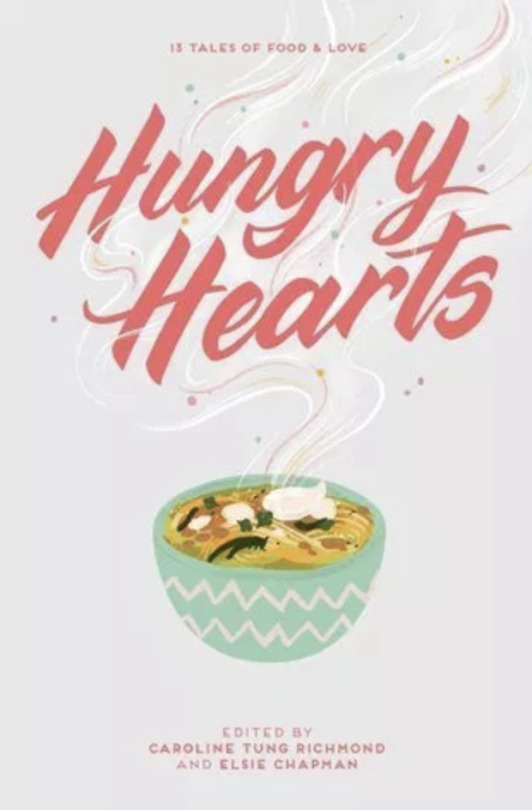

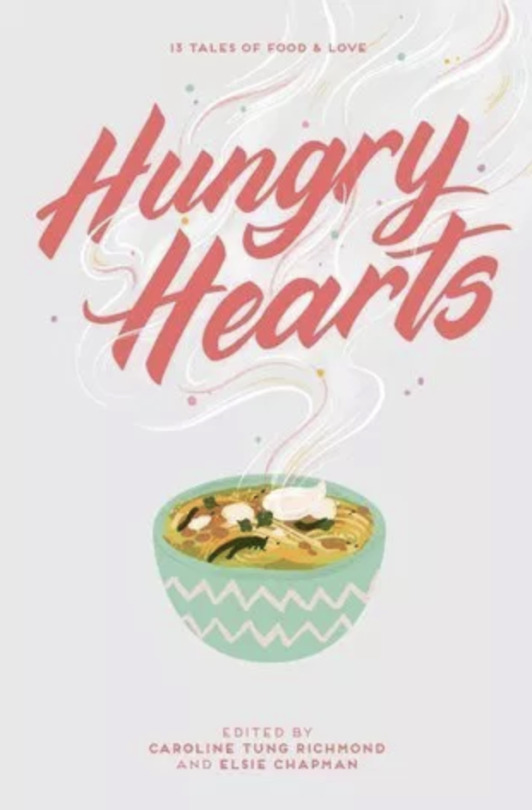
Today we welcome Caroline Tung Richmond to the blog. She is co-editor, along with Elsie Chapman, of Hungry Hearts: 13 Tales of Food and Love. Caroline kindly answers questions about editing an anthology, writing, sloths, and of course food.
Publisher summary: A shy teenager attempts to express how she really feels through the confections she makes at her family’s pasteleria. A tourist from Montenegro desperately seeks a magic soup dumpling that could cure his fear of death. An aspiring chef realizes that butter and soul are the key ingredients to win a cooking competition that could win him the money to save his mother’s life.
Welcome to Hungry Hearts Row, where the answers to most of life’s hard questions are kneaded, rolled, baked. Where a typical greeting is, “Have you had anything to eat?” Where magic and food and love are sometimes one and the same.
Told in interconnected short stories, Hungry Hearts explores the many meanings food can take on beyond mere nourishment. It can symbolize love and despair, family and culture, belonging and home.
I adore books featuring food. On a scale of 1 to 10, how hungry will we get while we’re reading Hungry Hearts?
I'm hoping for a 10! My mouth was definitely watering every time I edited the stories in this collection, and I would inevitably curse at myself that I couldn't sample the dishes I was reading about. So I'd recommend going out to eat right after you've finished Hungry Hearts -- or better yet, read it while you're eating!
What brought you and Elsie Chapman together for this project?
Twitter, actually! Elsie and I started chatting on Twitter years ago, and our friendship has grown via social media and emails. Back in 2017, I was tweeting about The Joy Luck Club and how I'd love to read more books that include its themes -- food, culture, family, and the tension between immigrant parents and their first-generation children. Elsie contacted me shortly thereafter to see if I'd be interested in co-editing an anthology around these ideas, and I said OF COURSE!
We spent about a month and a half refining the concept, drafting the proposal, and revising it with our agents before we went on submission. Much to our surprise and delight, the book sold quickly -- which was both wonderful and a tad stressful because I was nine months pregnant at the time! I believe we received the offer from Simon Pulse right before I delivered my son, and then we accepted it when he was about a week old.
Have you edited an anthology before? What are some of the challenges and rewards?
This is my very first time editing an anthology! Thankfully, Elsie has done this before (she co-edited the fabulous A Thousand Beginnings and Endings with Ellen Oh) and so she helped me navigate the learning curve. I also got wonderful advice from my friend Jessica Spotswood who has edited multiple anthologies, like Toil & Trouble and A Tyranny of Petticoats, which I contributed a short to.
My main challenge was dealing with taxes -- I hate paperwork and crunching numbers so no surprise there! I'd recommend consulting with an accountant if you're putting together an anthology since the taxes can get a bit complicated. But aside from that, Hungry Hearts was truly a joy from start to finish. I adored working with such talented writers, and I also loved working with Elsie and our editor Jen to shape the anthology as a whole. Usually writing a book is a very isolating process for me, and so it was refreshing to work on a project that required a lot of collaboration.
Is there a specific food you associate with family and/or love?
Oh, definitely! When I was growing up, my family would visit my paternal grandmother on Sunday evenings (we call her Nai-nai) and she'd make us dinner. My favorite dish of hers has always been her lion's head meatballs. I have no idea why they're called that -- and they're made out of pork, not lion, haha -- but it's a Shanghai dish and that's where my grandma grew up.
My Nai-nai's meatballs were always moist and perfectly seasoned, and she'd simmer them over a bed of Napa cabbage leaves and rice noodles that would soak up the yummy flavors. We'd serve everything over hot rice, and just thinking about it makes my mouth water and brings me back to my grandma's little apartment. Nainai is now 96 and doesn't cook anymore, and one of my biggest regrets is not asking her to teach me how to make those meatballs. I've made a couple recipes I found online, but they just aren't the same. But I'll keep trying!
Beyond this tempting collection, are there other young adult books you would recommend for our readers?
I've been reading a lot of adult fiction and non-fiction recently so I'm sadly behind on YA, but I'm really looking forward to checking out With the Fire on High by Elizabeth Acevedo because it's about an aspiring chef and I love stories about food. I'm also excited to read Maurene Goo's Somewhere Only We Know because it sounds like a delightful rom-com of a novel -- and it's set in Hong Kong! I'm hoping there's a scene or two that features dimsum because I live for dimsum. (Turnip cakes might sound bleh, but they are SO GOOD and I could eat a plate of them right now!)
If you’re allowed to tell us, what other projects are you working on?
Hungry Hearts is my first stab at contemporary literature and so it's a bit of a departure from my novels, which have all been historical fiction. My next book is a Cold War alternate history that's set in Washington, D.C. and that features super advanced robots. No title yet, but it should come out in 2020 from Scholastic!
This last question is fairly random and has nothing to do with the book, but on your blog I saw a photo of you holding a sloth. How did that come about? Sloths are amazingly adorable.
Aw, I'm so happy you asked! I love sloths, and back in 2012 I was lucky to spend a week volunteering at a sloth sanctuary in Costa Rica, which took care of orphaned and injured sloths. I spent my time there cleaning out the sloth enclosures, prepping food for them (chopping up carrots and sweet potatoes and the like), and playing with the babies (best job ever!). My favorite sloth was a little guy named Linus who was super sleepy and just wanted to be held all the time. I wish I could've taken him home.
We always appreciate hearing from book creators and look forward to reading Hungry Hearts now that it's out in the world.
Caroline Tung Richmond is the award-winning author of The Only Thing to Fear, The Darkest Hour, and Live In Infamy; and the co-editor of Hungry Hearts. She's also the Program Director of We Need Diverse Books, a non-profit that promotes diversity in children's literature. Caroline lives with her family in Frederick, MD.
26 notes
·
View notes
Text
Monthly Wrap Up: July
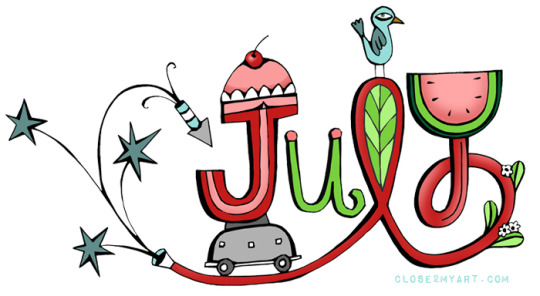
July didn't quite go how I planned it to. First, there was my families vacation to South Carolina. I brought several books with my because I thought I would just be able to crank out within a few days, but our stay was much shorter than usual and even during traveling I wasn't able to read as much for various reasons (fear of planes and driving in the dark). So in that time frame I was only able to complete 3 books, which was good but nowhere near what I was hoping. Than work started getting busy, and I had to deal with some graduate school stuff, so I didn't have as much time for reading. That all being said I was still able to complete 10 books, most of which were good and I gave 3 or 4 stars to (there were a few notable exceptions), and accomplished various reading goals, like completing the Reading Frenzy's Runaway with the Circus Readathon (which consisted of 6 prompts) and did my classic of the month. I will also say this month had a huge variety of books, both in the genre and status, and while I still definitely gravitate toward adult fantasy, I feel like picking up books outside of my preferred genre is becoming easier as I end up liking more and more of those selections. To summarize, despite not getting to all the books I wanted to and the three 1 star reads, this month was really solid and I definitely found some books that I could add to my favorites of the year.
Morning Star by Pierce Brown: Darrow must complete the mission of the Sons of Ares, to break the chains of Society, but the events of the previous book have completely changed things. With dwindling resources and allies, Darrow and the Sons of Ares make a final stand against the tyranny of the Sovereign and the Jackal. Upon rereading this book, I'm definitely glad that Brown is continuing the series because I don't think this works well as a finale. When I read the last book in the series, I want to feel that full emotional impact and want a sense of resolution from the ending. I'm not saying everything needs to be completely fixed, I like having a few loose threads, but this ending leaves me with such a sense of uncertainty that I almost feel anxious, which is not something I want from a finale. My biggest issue with this book was probably the pacing of the book, and how everything was just rushed so it could be crammed into one last book. I know there's a lot that this book had a ton it needed to cover, and without a doubt one of this series strongest feature is its action, but something was off and this seemed to produce a ripple effect that tainted other elements of this book. The stakes didn't feel as high, despite the fact that they were potentially world ending stakes. Characters arcs were incomplete, with only Darrow and Sevro having really progressed in any way (and even then I have mixed feelings about Darrow's arc), and romances were really forced into the narrative with little chemistry between the couples. New characters that were added in honestly had little impact. There was, however, 1 major highlight of this book, and really the whole series. That was the villain, The Jackal. As a villain, he is terrific. He's terrifying, amoral, cunning, and deceptive. He isn't a fighter, but that's what makes him so dangerous, because he knows how to get others to do the fighting so that all opponents underestimate him. His petty grievances against his family, and self worth issues make him human, but he is anything but humane. He's honestly one of the best villains, ever. Morning Star was a fun, enjoyable read, but it really lacked the development that it needed to elevate and complete it, and as a finale it really is disappointing. Morning Star received 3 out 5 stars and for the Circus Readathon was my pick for the Flyer prompt “a book set in space.”
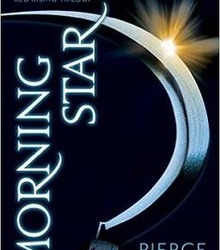
Out of the Easy by Ruta Sepetys: When I completed Sepetys novel Salt to the Sea, I loved it so much that I decided to read the rest of her books. I took this one with me when I went on vacation because I would be in South Carolina, and since this book is set in the south I thought it would be the perfect time to read it. This is a historical fiction set in New Orleans during the 1950s. Josie is the daughter of a prostitute with big dreams of leaving behind all the prejudice and brothel that she has grown up in and starting fresh with a college education from a prestigious college. I admit I had high standards going into this one because of Salt to the Sea, and while Out of the Easy wasn't as good, I still liked it. There were a few hiccups however. This narrative lacked direction at times, to the point where things just stalled, with no action or quiet moments. I also didn't like the romance. It wasn't awful but very predictable and just didn't have enough substance or development, especially when compared to almost every other relationship. The one other thing I struggled with was the setting itself. The writing just didn't convey the vibrancy of New Orleans, which is shame because New Orleans has such a colorful reputation. Most of these complaints, however, were minor and this book managed to pull of a really solid, more mature narrative without being depressing. Characters were the highlight of this book because all of them had a life like quality to them, but the best one was probably Josie. Watching as various relationships shape who she is, working hard to achieve her dreams, and having to tackle disappointments and harsh realities made her She's definitely a flawed individual, but I think that at least makes her relateable and sympathetic. Still not as good as Salt to the Sea, but a decent good and one of the better historical fiction novels that I've read. Out of the Easy received 4 out 5 stars.
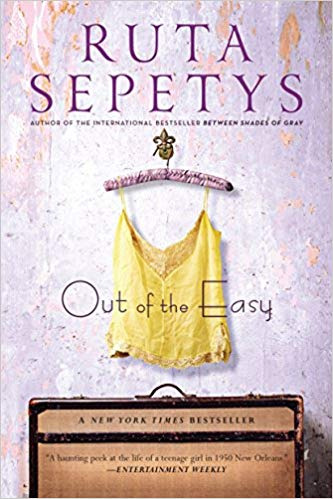
Stories of Your Life and Others by Ted Chiang: Since I was going on vacation, I just wanted a nice quick read, and I tend to overall like short story collections. I wasn't sure what I expected going into this, I think I was hoping for something like Ken Liu's Paper Menagerie anthology, but that wasn't what this collection was. It was exclusively science fiction stories (though there were a couple stories that blurred the lines) but the most surprising aspect was definitely how many hard SF stories there were, which is a sub genre I'm not comfortable with yet. Those stories were definitely my least favorite because not only did I disliked what they focused on, physics theorems and mathematical proofs (which I've always struggled with) but also from a writing stand point these stories were the weakest. There were several issues present in most of the stories (weak endings, cold tone, impersonal characters, and disjointed narratives) but they were just really all present and emphasized in the 2 hard SF stories (Story of Your Life and Division by Zero). On the bright side, there was some very good stories that I really loved that I think nailed everything a short story should be. My favorite 2 stories were Tower of Babylon and Seventy Two Letters, both of which would get 5 stars. The individual stories get mixed reviews from me, ranging from poor 1 star, to average 3 star, to excellent 5 star, and despite the fact that execution felt weak in most of the stories, most of the stories at least had some interesting themes. Overall thought it was a decent collection and I'm glad I read it, but I wish I had known it would be just SF stories. As a whole, Stories of Your Life and Others received 3 out 5 stars.
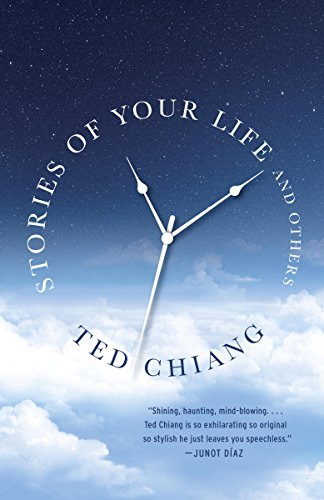
The Last Unicorn by Peter S. Beagle: This is classic fantasy story that somehow managed to stay under my radar until a couple years ago. I honestly didn't expect much out of it, but at the very least it would be a quick, easy read, with a simple premise of the last unicorn going on a quest to find the rest of her kind. After completing this one, it actually managed to exceed my expectations. It definitely hit all the beats of a classic fantasy: a long quest, medieval European setting and myths, wicked king, magic and prophecy. There's a lot of elements about the book that could make me dislike it, because I have struggled with several epic fantasy novels in just this past year. The difference is that The Last Unicorn is significantly shorter than the other books, and that is without a doubt what makes it work for me. Instead of dragging the story out as long as possible to make it seem grand and epic (because everyone's trying to emulate Tolkien), Beagle gets right to the point and keeps everything at a smaller scale. This pays off because almost every scene feels worthwhile and I'm actually invested in the characters, who were all interesting and well written. Even things I would normally irritate me, I thought was well done. Specifically the prophecy aspects of the narrative. Prophecies are so overused, and rarely done well, they usually make the story feel cheap. In The Last Unicorn, the prophecy wasn't a fundamental part of the story, but it did add layers and the way it played out was done in such a poetic way that it really was a satisfying addition to the narrative. There were also some great themes in this story, in fact the whole thing felt like a mystical allegory for growing up, and I personally love finding good coming of age narratives. There was a lot about this novel that just worked for me and I thought was well executed, but there were a few missteps. Most were minor, like one filler scene (that was a bit weird), and the juxtaposition of modern pop culture reference being present in a medieval setting, but the biggest issue I had was the ending. It was a vague and just felt like I was missing something (though I can't pin point exactly what), but the ending definitely dropped the rating a little. All in all this was a solid fantasy that stands the test of time, and I highly recommend it to anyone looking for a good stand alone fantasy novel. The Last Unicorn received 4 out 5 stars and was one of the books I read for the Reading Frenzy's “Runaway with the Circus” Readathon.
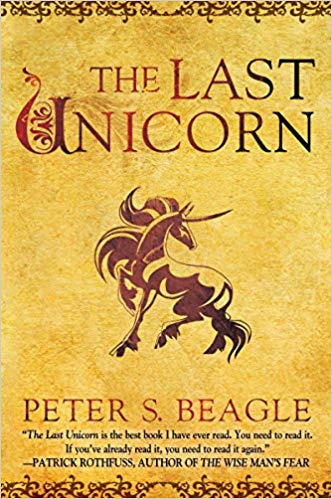
Brisingr by Christopher Paolini: Long books can be a struggle to get through, especially if you become increasingly frustrated with the story, and oh boy was that the case for this one. Over 700 pages, and I'd say about 600 of those pages was just filler. Most of the story was dedicated to sub plots which I think were supposed to add to the characters and the world (like the Dwarves electing a new king) and the only events that tied the book to the rest of the series was at the very beginning and end of the book, which makes the entire book feel unnecessary. To add insult to injury, this tome of a book was almost exclusively in the POV of people I didn't care about. Eragon was annoying at first, but now he's just bland because his purpose in this book seemed to just be a mouth piece to spew exposition. There's also the detail of him having made allegiances to everyone he comes in contact with, and while this could have been an interesting plot point and character flaw (since everyone points out that he's basically spread himself to thin) nothing really comes of it. Roran got a lot more screen time in this book, and I hated his POV in the second book and I disliked it even more in this one, because he doesn't do anything and doesn't deserve all the leadership he gets. He's basically a discount Eragon, his chapters were so grating that I just started skipping them all together. The ultimate slap in the face though, was the removal of Nausada's POV. She's my favorite character, by far, the most complex, and I really felt her absence. In general I was so disconnected from the story and the characters, that after days of finishing it I honestly don't remember most of what happened. It sucks because not only was this a favorite series of mine as a child, but also because I see glimpses of potential for this series to be elevated for adult audiences but nothing is done with it. I'll read the last book at some point, just to finish the series, but I'm in no rush to get to what will probably another disappointing tome. Brisingr received 1 out 5 of stars.

The Girl with the Dragon Tattoo by Stieg Larsson: For a little over a year I've wanted to read this book. Granted it's a mystery which falls out of my usual genre, but it was receiving enough attention to make me curious. Almost immediately I had issues with this book, and those issues stretch through the entire narrative. First is the writing style. Larsson (or at least the translator, since this was originally published in Sweden) seems to use a very dry style, utilizing the precise words that are needed. I have a history of disliking books with a dry style and this one was no exception. The result was that I was honestly bored, felt like I was reading a lot of filler that focused on what exactly everyone looked like and what they were doing, and just in general very detached from the narrative. The other part of this book that was off putting for me was the sexuality and sexual violence. Like this is definitely a novel I would only recommend for an adult audience. I already knew there was going to be a rape scene with Salander, but there was more than just that, which I was not expecting. It just builds up, from the male protagonist constantly having casual sex, to the way men regard Salander, to Salander being explicitly raped twice, then a missing person case turning into a hunt for a sexual sadist with a trail of bodies. It was so bleak and really turned me off from the narrative. Combining the writing style and sex, and I ended up skimming the majority of the book, because every time I tried to fully read, I just felt worn down. Speaking of which the mystery narrative wasn't that good. I've seen worse but I wasn't invested in this one at all, there were some notable holes in it, and toward the end it was pretty obvious who was the killer. I wasn't invested in the characters because they basically felt like archetypes that I either disliked or had seen way too many times, although Salander did manage to have a few shining moments. Basically there was nothing that I liked about this story: the tone, the writing, the violence, the characters, and the story itself. I personally would recommend just watching the movie if you're curious about this one, since I could see it potentially being better in movie format. The Girl with the Dragon Tattoo received 1 out 5 stars and was my pick for the PopSugar prompts: “set in Scandinavia,” “published post humously,” and “features an amateur detective.”
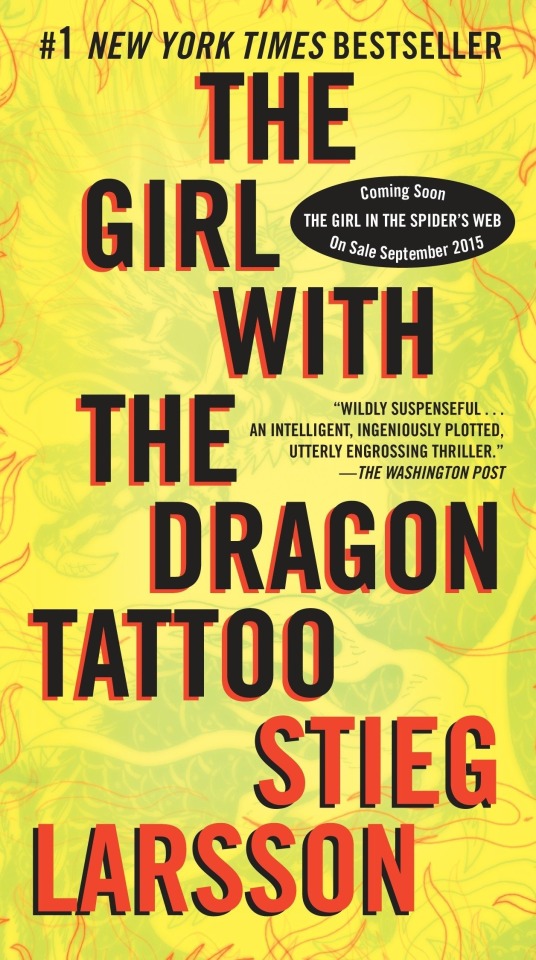
Fangirl by Rainbow Rowell: The only reason I read this book is because I wanted to knock out some challenge reads. I didn't expect to love this one, it's not in a genre I gravitate towards and Rowell's books strike me as a mix between John Green and Nicholas Sparks novels, neither of which I have any interest reading. However, this novel fulfilled 2 prompts, so I really needed to get this one done. Honestly, this one felt like I was reading fanfiction. The writing was choppy and juvenile, the dialouge was awkward and unnatural, the characters were card board cutouts made from a collection of cliques, there was no chemistry with the romance (love interest was a bit of creep at times), and whenever there was a plot it was melodramatic moments that the author was trying to force. Even though this was supposed to be a coming of age book, with the protagonist going off to college, and being in a fandom (with the fictional fandom being a blatantly gay Harry Potter), it delivered on none of that. If you want a good book on fandoms, with a well written protagonist with social anxiety, I would skip this book and just read Eliza and Her Monsters. Everything about this book was lazy and awkward and was even uncomfortable at moments, and I'm just glad I got it over with quickly. Fangirl received 1 out 5 stars and was my pick for the PopSugar prompts: “set on a college campus” and “author whose 1st and last name start with the same letter.”
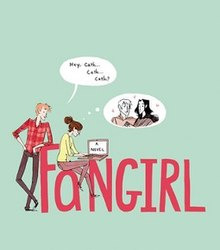
The Strange Case of the Alchemist's Daughter by Theodora Goss: This book was in a word, fun. All this book wanted to do was tell a fun story, and I think it delivered on that. The whole story focuses on Mary Jekyll as she discovers that her late father was part of a secret organization of scientists that might be connected to a recent string of murders in London. Along the way she meets several other women in the same predicament as her, and together they work to stop the mysterious Society of Alchemists before it's too late. Loved how the whole book is just a nod to several iconic literary figures, especially of Victorian Literature, but it really focuses on the females and the effect that their “fathers” had on them. The way the book was written, as a sort of memoir with each of the girls adding in their own commentary, worked well because it gave us some insight to each of their personalities as well as making slight commentary on the Victorian Era. Surprisingly I also liked how the mystery was handled, because that's usually where a story comes crashing down for me. I think that's because it took it's time to develop and arise naturally, kept the stakes relatively small, and set the groundwork for a series long conflict. I thought Mary was a pretty good protagonist, a practical minded leader and good hearted individual. While the book keeps the plot simple, which worked, its also kept most of the characters simple, which did not entirely work. For most of the girls, and even other side characters, I felt like they weren't developed much outside of their original context. Which meant that I didn't feel much attachment to them, nor did I get a feel for their inner dynamics, which is rather important for group based stories. Granted the book didn't suffer too much from it and we have the whole just of the series to further develop them. In my opinion this book is ultimately just a fluffy story that's great for reading slumps. The Strange Case of the Alchemists Daughter received 4 out of stars and was my pick for the Circus prompt “Cotton Candy: a fluffy and light hearted read.”

Nevernight by Jay Kristoff: Hyped books always make me skeptical, because more often than not I've been burned by them. Initially I got this one as a gift for my sister because it seemed like the type of book she would enjoy, but I was intrigued because of all the praise it had been receiving. If the premise of this book sounds familiar, a young girl training to take revenge on a corrupt government that executed her family, that's because it is. At the start this book does feel just like a copy of Arya Stark's narrative, and even the rest of the story features overused tropes that I don't like (Mean Girl and Mean Teacher) but I think everything else about this book makes up for that. The world was really interesting, a blend of various real world time periods and cultures but injected a healthy amount of fantastical elements. Loved the Red Church and the various classes, aka Halls, because you actually get to see what the acolytes learn and how it would be useful. “Truths” was definitely my favorite because that was the class with poisons and chemicals. I also appreciate the fact that while this definitely is an adult fantasy, and has dark and grim elements, it never steps over the line of being bleak to an absurd degree like a lot of fantasy (adult and YA) currently is, which is nice because I hate grimdark books. Characters were all interesting to say the least because while each was unique, with their own quirks and motivations, they all have a cut throat streak to them since all are either assassins or training to be assassins. While I did like Mia and found her to be an excellent protagonist, she wasn't actually my favorite character, which speaks to how good the side characters were. All the relationships in this book were artfully done and really tugged on my emotions. Like I wanted to trust others and for true friendships to be developed, only for the rug to be ripped from under me and those relationships only to end in death or betrayal. Even liked the romance, which is saying something because it's hard for to find a romance I think works well (still didn't need the sex scenes though). As for the plot, I've already stated that there were some tropes and the story did drag at times, but overall I liked the story. I liked seeing the various twists and turns that it took, I thought the flashbacks were well utilized, all the pieces just clicked together, and by the end of the story I was on the edge of my seat with anticipation. There's also a matter of the footnotes, which I know some people don't like, but I personally liked them because of how they added world building but also conveyed the narrators wit. This book wasn't super original, but everything about this book was really solid and I honestly loved it. I'm eager to see where the rest of the series goes. Nevernight received 4.5 out 5 stars, and was my pick for the PopSugar prompt “religious setting,” and for the Circus Readthon prompts: “Big Top” (red, white, black colors on cover), “Grandstand” (hyped book), and “Ringmaster” (first book in a series).

The Art of War by Sun Tzu: Over the years, I've read a variety of books. Mostly fiction, mostly fantasy but I've also read plenty of non fiction and classics, yet this one is really isn't like any other book I've read. A blend of classical writing and non fiction, above all it's a book on military tactics. While the concept is good, and I did find this insightful, I don't read books that focus on military. It's such a dry, technical form of writing that I struggle to visualize and can't connect with, and as a result I just tend to glaze over battle scenes, even in fiction novels that I'm really liking. I also didn't like how the supplemental notes and translations were placed within the book, to the point where the writing felt very choppy, and I honestly struggled with getting through the last 50 or so pages. On that note, I think Art of War is an interesting read, that illuminates the delicate relationship between peace and war, and does make the subject of military strategy approachable and understandable, but the subject still isn't something up my alley, and there were times I was just bored when reading it (both due to the subject and the writing itself). The Art of War received 3 out 5 stars and was my classic read of the month.

Thank You Everyone
Keep Calm and Keep Reading
#monthly wrap up#the art of war#sun tzu#nevernight#jay kristoff#fangirl#rainbow rowell#morning star#red rising#pierce brown#out of the easy#ruta sepetys#nevernight chronicles#girl with the dragon tattoo#millennium#stieg larsson#stories of your life and others#ted chiang#the last unicorn#peter s. beagle#the strange case of the alchemists daughter#the extraordinary adventures of the athena club#theodora goss#brisingr#inheritance cycle#christopher paolini
14 notes
·
View notes
Text
Grayshaw
*Enjoy!
Science Fiction Book Club
Interview with Bruce Sterling October 2018
Bruce Sterling is a prominent science fiction writer and a pioneer of the cyberpunk genre. Novels like Heavy Weather (1994), Islands in the Net (1988), Schismatrix (1985), The Artificial Kid (1980) earned him the nickname “Chairman Bruce”. Apart from his writings, Bruce Sterling is also a professor of internet studies and science fiction at the European Graduate School. He has contributed to several projects within the scheme of futurist theory, founded an environmental aesthetic movement, edited anthologies and he still continues to write for several magazines including Wired, Discover, Architectural Record and The Atlantic.
David Stuckey: Have you considered a return to the world of "The Difference Engine" for stories or another novel?
*That won’t happen.
David Stuckey: If you were going to write "Involution Ocean" today, what would you change or do differently?
*Well, alien planet adventures are a really dated form of space opera. On the other hand, they’re great when you’re 20 years old. If I were doing a project like that today I might make it a comic book. Or a webcomic. It might make a nice anime cartoon.
Richard Whyte: In the 2018 'State of the World' conversation on the Well, you said you were in Ibiza working on a novel. Are you able to tell us anything about it yet?
*I dunno if I’m ever gonna finish this epic novel about the history of the city of Turin, but I seem to get a lot of work done on it when I’m in Ibiza. It’s about Turin, but when I’m actually in Turin I tend to work on weird technology art projects and goofy design schemes.
*Also, look at this palace. I’m supposed to work on my novel in the attic of this villa. That’s pretty weird, isn’t it? This villa was built in the same era as the book I’m working on, which has the working title “The Starry Messengers.” Like this villa, it’s big and baroque and complicated.
https://fenicerinnovata.tumblr.com
Andrzej Wieckowski: We read 'Sacred Cow' for one of our short story reads a few months' ago. Were themes such as Bolton's historic connection to the Indian cotton industry and immigration to this country deliberate or unconscious? And as it's my home town - did you visit? :)
*There aren’t any towns in Britain without some historic connection to India. As it happens I’m flying to India day after tomorrow to meet with some Indian science fiction writers.
*I used to hang out in Great Britain rather a lot. Brexitania I don’t much care for. It’s a hostile, troubled place.
Gary Denton: You were active in the Viridian sustainable design movement that many readers may not know about. Do you think that major corporations have taken that over and it is less fringe now?
*I tend to do activist stuff. Also, you get more done if you don’t ask for any credit. I’ve come to understand that a lot of my most influential writing was stuff that I never got paid for. Some of it never got published.
*I was just at the Whole Earth 50th reunion about a week ago. They’re a good example of a “movement” that was super-influential and somehow a dreadful failure at the same time.
*As far as major corporations, meaning large public enterprises with a lot of shareholders, I don’t worry about them any more. It’s actually moguls and oligarchs who are the big problem nowadays.
Gary Denton: Do you also see a change in the major polluters now compared to 25 years ago?
*They’re a lot more violent. Blood for oil, killing off opponents in sinister ways, not a problem for them any more. They’re quite grim and red-handed. They used to be engineers, but now they know that they are culprits.
Gary Denton: You once said that the cyberpunks were the most realistic science fiction writers in the 80's. Who do you think are the most realistic science fiction writers now?
*Could be the Chinese.
Richard Whyte: Whenever someone here asks about the angriest SF work ever, I always seem to end up recommending your fine short story 'Spook'. Do you think of it as an angry story?
*Well, not really. It’s a rather severely disaffected story from the point of view of a person who’s not human and knows it. “We See Things Differently” is rather an angry story; it’s about a terrorist assassin with a righteous grudge.
Eva Sable: What is the experience of collaborating with another author like for you? Especially when working with someone who, like yourself, is rather an individual. (Never met William Gibson, but he strikes me as someone who would be more comfortable working on his own)
*I tend to collaborate rather a lot. It helps if the two of you are combining forces in order to learn something together. Gibson and I agreed that we couldn’t possibly write a work like DIFFERENCE ENGINE alone. We used to urge each other to do it, but eventually we just had to have a lot of long, abstruse discussions of what a book like that ought to do.
*If you read the stories I wrote with Rudy Rucker you can see that a lot of those texts are basically him and me discussing weird ideas. We’ve got a reason to write those stories – a high-concept, and then there are pages of bizarre hugger-mugger where we push the concept as hard as we can. Then we give up.
*Nowadays I spend a lot of time negotiating or collaborating with artists, designers, architects. I don’t get jealous about the origins of good ideas.
Richard Whyte: Your 1980s SF criticism seemed very much in favour of 'Radical Hard SF'. To what extent do you think your own fiction 'takes its inspiration from science, and uses the language of science in a creative way'?
*I wrote a lot of that in the 1980s. Nowadays I tend to write speculative work that’s more influenced by industrial design rather than by science.
Richard Whyte: In the early 1980s I believe you were associated with a group of like-minded SF writers known as 'The Movement', who were subsequently renamed as 'cyberpunks'. Overall, do you think this name change was a good or a bad thing?
*If people notice you, you’re gonna get a public slang name anyway, so it’s good if you can cheerfully put up with it. As for forming like-minded groups, that’s a valuable life-skill.
John Grayshaw: Who are your favorite science fiction writers? And how have they influenced your work?
*Well, those favorites change with time. In different decades of my own life I’ve had different ambitions for my own science fiction. I tend to write pastiches. Lately I’ve been writing a lot of “science fiction” that’s heavily influenced by Italian fantascienza, or, really, Italian fantasy generally.
*I’m a long-time Juies Verne fan. I wouldn’t describe Jules as a personal “favorite,” but I recognize him as a titan of my genre. Knowing the personal details of the guy’s career as a working creative has been of a lot of help to me.
*I had a couple of professional SF writers who I regarded as my literary mentors. They’re both dead now: Harlan Ellison and Brian Aldiss.
John Grayshaw: I heard that you are currently dividing your time between Belgrade and Turin, do you miss living in Texas? Or America in general?
*I’m back often enough that I don’t really “miss it.” I find that if I stay in one place too long, I tend to miss travelling. I roam a lot. If I get too old and tired to lift a suitcase and I settle somewhere, it probably won’t be Austin, Belgrade or Turin.
John Grayshaw: I recommend everyone read your essay "Cyberpunk in the Nineties" (http://lib.ru/STERLINGB/interzone.txt) to understand that Cyberpunk was a movement and can't be removed from its time and place...But a Cyberpunk aesthetic has emerged over the years and that is what writers like Neal Stephenson or Richard K. Morgan are emulating. Was this aesthetic conscious at the time?
*Well, we spent plenty of time fussing about it. A lot of that conceptual work doesn’t really show on the surface. Aesthetics interest me a lot. For instance, I’m the Art Director of the Share Festival in Turin, which is an Italian technology-art fair. Italians are good at fussing about how stuff looks.
John Grayshaw: Did "Mirrorshades" have a theme? What directions or guidance did you give the writers?
*It didn’t have a set theme. Mostly I was trying to pick work from colleagues I respected, that I thought put them in a good light.
John Grayshaw: Other than writing what are your interests/hobbies?
*I like design and technology art. Also I travel a lot. I spend a lot of time in arcane online research.
John Grayshaw: Why do you think Steampunk has become a popular subgenre/aesthetic in the last 30 years?
*I think it’s about the craft aspects of steampunk. Hobbyist people like the costumes and the gadgets. It’s like traditional historical recreation groups, but with an alluring fantasy aspect.
John Grayshaw: Can you explain why you have said that Artificial Intelligence is a bad metaphor?
*I think the AI metaphor gets in the way of actual progress in the field, with actual hardware and software. Rodney Brooks explains the problem a lot better than I can, and nobody can understand his explanations either. That’s not exactly fair – actually I get what Rodney’s saying enough to more or less agree with him. He’s an expert, so I’d refer you to him.
*”Deep Learner” and “neural net” are kinda better metaphors than “Artificial Intelligence,” but they’re still metaphors. We haven’t created sharp, focused words for what these odd devices really do. “Intelligence” is not what they’re doing.
John Grayshaw: Cyberpunk was a dark look at the future. Do you feel optimistic or pessimistic about the future?
*People always ask that. People in Russia never thought that cyberpunk was “dark.” Also, whenever you get to “the future,” no matter how scared or happy you are about some particular historical episode, there’s always more future on the way. Eventually people are dead, so if you ask if I’m optimistic or pessimistic about the 20th century, the whole idea sounds silly. The future is a kind of history that hasn’t happened yet.
John Grayshaw: In cyberpunk technology often contributes to society’s ills. What lesson do we take from this? That we must learn how to live with tech or that we should reject it and live like the Amish?
*Kevin Kelly kinda likes the idea of living like the Amish. Kevin’s an interesting guy. If I myself wanted to “live like the Amish” I’d probably move to Christiania in Denmark, where at least they have reggae music.
John Grayshaw: Do you keep up with the latest technologies? Or do you stay "off the grid?"
*I do both, actually. I’m generally so “off the grid” that I’m not even in its time-zone. I don’t have a business card, there’s no settled mailing address, I’m never on Facebook, and no one knows my phone number. Like they say in the world of electronic privacy, “I have nothing to hide, but I have nothing I want to show you, either.”
John Grayshaw: Do you think people will have "immersive" VR type experiences on the internet in the next 20 years?
*They have it already.
John Grayshaw: What do you feel is your legacy?
*Hard to say. It’s like asking a Beatnik writer what “his legacy” is. The Beats wrote a lot of more-or-less memorable stuff, but there’s also the existence proof that somebody was able to live like that, and that is their legacy. I lived in a different historical period than the Beat writiers, but a lot of the stuff that entertained and engaged me is also quite archaic nowadays. I don’t thing people aspire to emulate Bruce Sterling, but they do like the idea of operating in the same cultural spaces that I do. That something lively can exist between “science” and “fiction,” or between “cyber” and “punk,” that’s a valuable thing to know.
2 notes
·
View notes
Text
Short story: Family Dancing: stories by David Leavitt
Full text: Unfortunately, I wasn’t able to provide a PDF to add a full text. I have a physical copy, myself and was therefore able to use it for this anthology.
Tender, unsettling, and amusing, these stories present families all unhappy in their own different ways. A mother who presides over her local Parents of Lesbians and Gays chapter has trouble accepting her son's lover. A recently separated couple's compulsion to maintain a twenty-six-year tradition seems to magnify futility. "Territory" is about a male persona named Neil Campbell. His mother, still a peace worker in the age of Ronald Reagan, has intellectually accepted her son’s homosexuality, but not emotionally When Neil invites his lover, Wayne, to come home for a visit, the situation is much like that of a young man bringing his college roommate home for vacation—except that Neil worries about whether they will make love in his house and feels like an embarrassed adolescent when his mother and Wayne first meet. The story is balanced between Neil’s anguished inner guilt and a few delicate external events that challenge the tolerance of his mother, regardless of the fact that she is the president of the Coalition of Parents of Lesbians and Gays. For example, the mother’s fortitude is tested when she shines a flashlight on them as they make love the first night in the yard and when all three go to a motion picture together and Neil is caught putting his arm around Wayne. “Guilt goes with the territory,” says Wayne, and indeed this seems to be the basic focus of the homosexuality stories. At the end of “Territory,” when the two young men return to New York City together, the reader is supposed to believe that Neil is gradually beginning to accept himself. It is, however, the mother’s painful balance between acceptance and revulsion that dominates this story.
Personal response
Even nowadays, LGBTQ is a big problem. My friends and I were actually confronted by this at Windesheim itself when two men were trying to convince my LGBTQ friends that if they simply prayed to God, they'd turn straight. Right now, they were going to hell. One of the men proceeded to tell us that his wife was in a lesbian relationship about ten years ago, but turned straight when she found the grace of God. As someone who grew up with family members and friends being LGBTQ, I don't understand why people aren't allowed to love whomever they want to love. I get angry when ignorance, discrimination and hatred are geared towards the LGBTQ because it's basically attacking my brother. Loving whoever you want to love should not be a reason for not fitting in. I added this to my anthology because my anthology is all about the pressure people experience to ‘fit in’ to what society wants us to be. LGBTQ usually don’t ‘fit in’ because so many people still consider them ‘abnormal’.
How it broadened my horizons
I learned a lot about the topic from these short stories. There’s a clear struggle in it and the author paints the picture of multiple struggles making people suffer.
As explained above, there’s a clear struggle between wanting to be ‘normal’ but then again not offering people the opportunity to really get to know the circumstances because there’s always the fear of unacceptance. I personally haven’t experienced the particular topic that was written about in the short stories, but I have experienced many similarities.
It was odd to see my own feelings written in such a way that I could recognize them in something that I usually am not able to relate to.
How the text links to the theme
David Leavitt is an American novelist, short story writer and a biographer. He is openly gay and has often explored gay issues in his works. As a teenager, he was frequently frightened by gay novels that placed emphasis on the ideal male body. He found this theme, and it's suggestion that homoerotic fulfilment was reserved for the exceptionally beautiful young men, to be intrusive. His writing explores universal themes such as complex family relationships, illness, as well as class and sex exploitation. Illness and death are also recurrent themes in his work, inspired by his experience with his mother's cancer diagnosis and eventual death when he was growing up.
I chose this collection of short stories because they mostly feature topics that I haven't necessarily shown or noted yet, but that fit the theme that I'm working with. The biggest reason why I chose it is because of one short story in particular: the first story in the collection (and one of the longest), “Territory.” I explained more about this above.
Explanation of how I found and selected the text
This was recommended to me by one of my teachers. I had been struggling to find a short story that I felt was fitting and eventually gave up and decided to ask for help. I hadn’t heard of this collection of short stories before, but when I bought the book and read it, I felt it fit my theme quite well because it points out another part of my anthology that I had not discussed yet.

1 note
·
View note